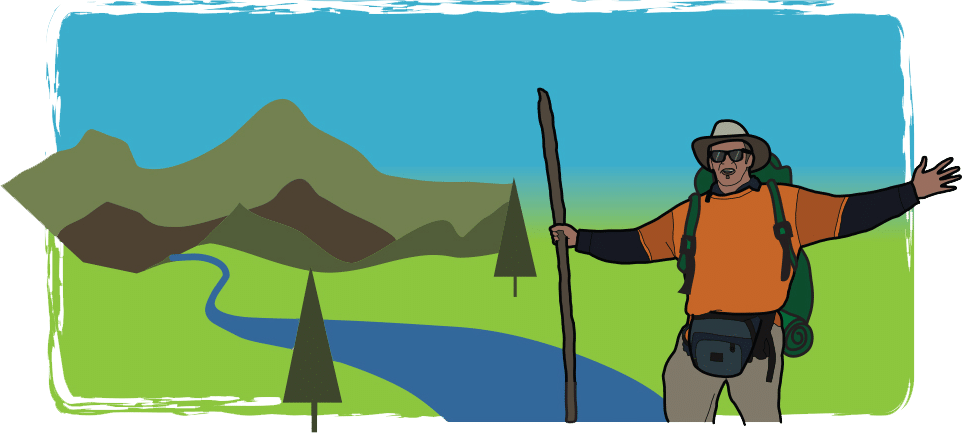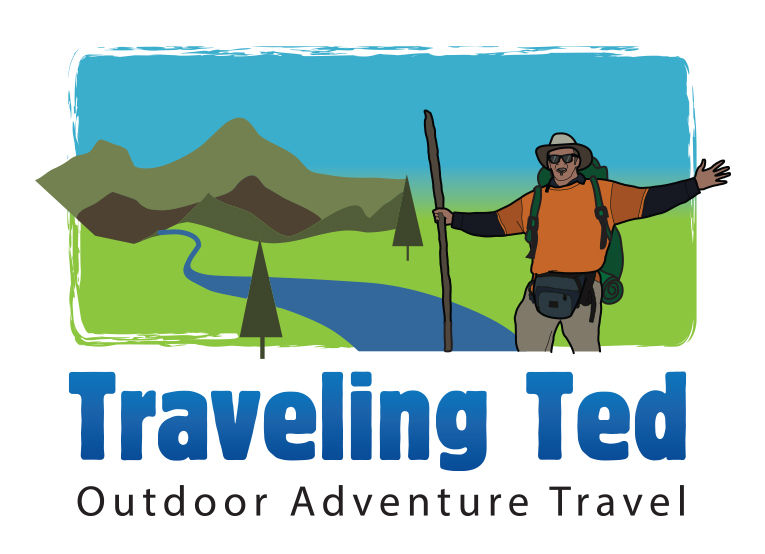While doing research on Sri Lanka national parks, I quickly discovered that Yala National Park is the most popular and the best chance to see leopards. Wilpattu National Park is a bit more of a darkhorse and not as crowded, but many decide they like it better. Wilpattu National Park is not as popular because it is outside the popular southern tourist circle that includes Kandy, Ella, Yala, southern beaches, and Galle. To visit this park, visitors need to either make a special trip to Wilpattu National Park Sri Lanka or widen their circle to include. It is well worth the trip and extra time needed to visit.
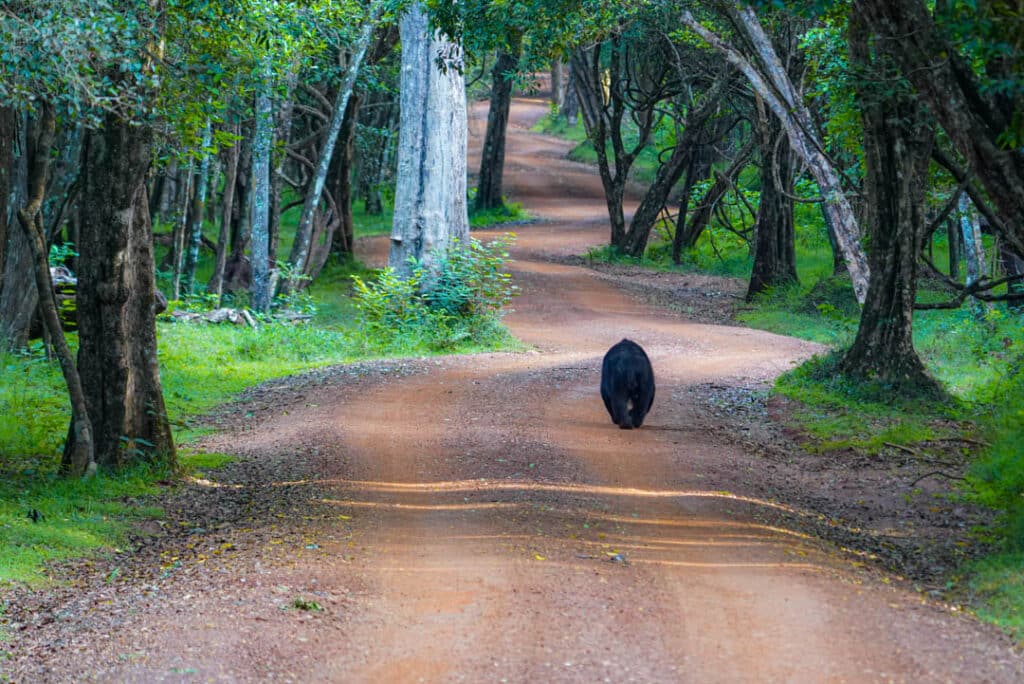
Seeing a leopard contrasted against the red dirt road is an iconic image of Sri Lanka. No leopards along the red dirt roads, but did see sloth bears, so that will have to do.
Two days in Wilpattu National Park Sri Lanka
I chose two days in Wilpattu National Park. I was going to do a full day safari the first day, stay as close to the park as possible that night, then do a half day safari the next day. From Anuradhapura, I negotiated a ride to the gates of the park in a tuk-tuk. This cost about $17 USD. It is easy to secure a ride in town. Any hotel can arrange this, you can order on Pick me (an Uber like app for tuk-tuks), or just hail one on the street.
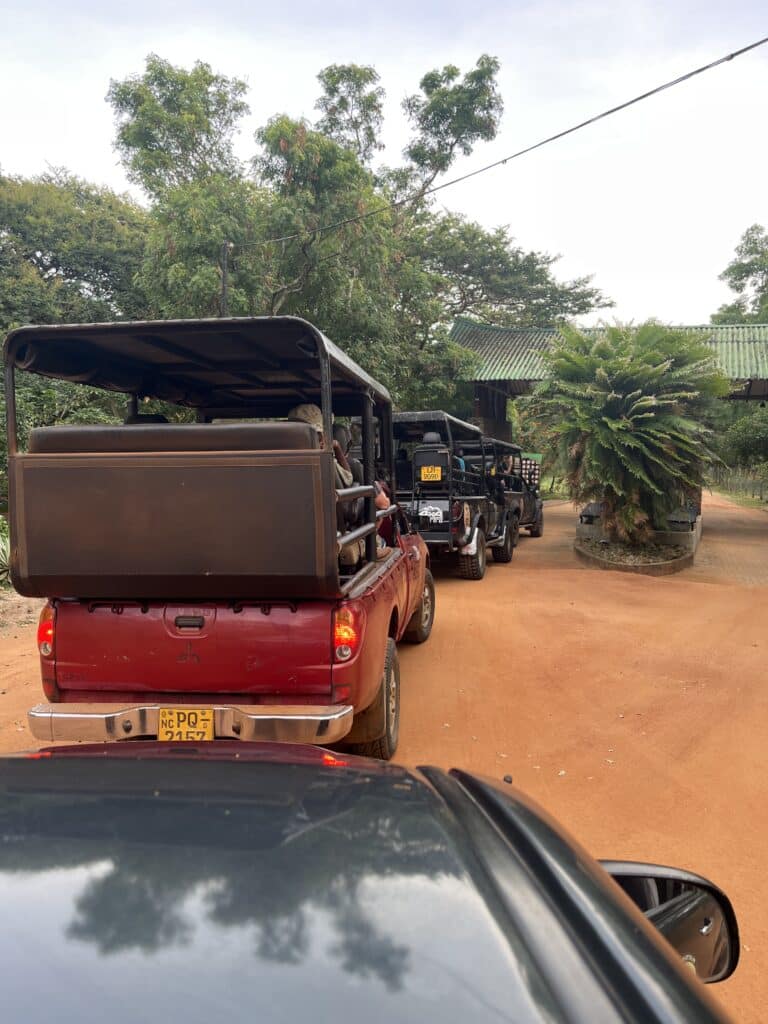
Wilpattu National Park safari queue in the morning. It was not nearly as long as the one in Yala.
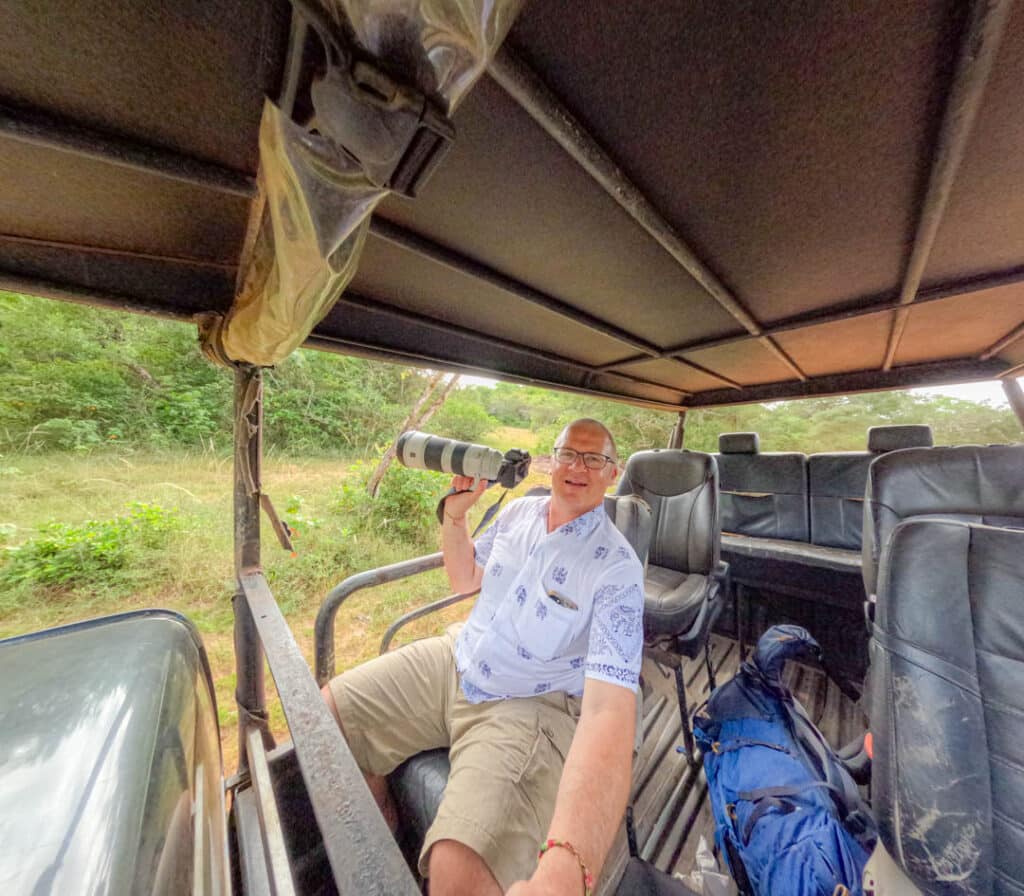
Wilpattu safari truck selfie
Related: Yala National Park Sri Lanka safari
My guide met me at the gates of the park. I gave him the funds for the entrance fee, and we stood in line to get my ticket. There was about ten other safari trucks waiting in line to enter the park when it opened. This may seem like a lot, but the park is huge. In fact, it is the biggest national park in Sri Lanka. When we got inside the park, there is only one road in, so it seemed crowded at first, but once we got to where there were more roads, the trucks dispersed. We would go long periods of time without seeing anyone else except when there was a leopard or another exciting animal.

First solid view of a male Indian peafowl. Colloquially, they are called peacocks, but this is just the name for the male species.
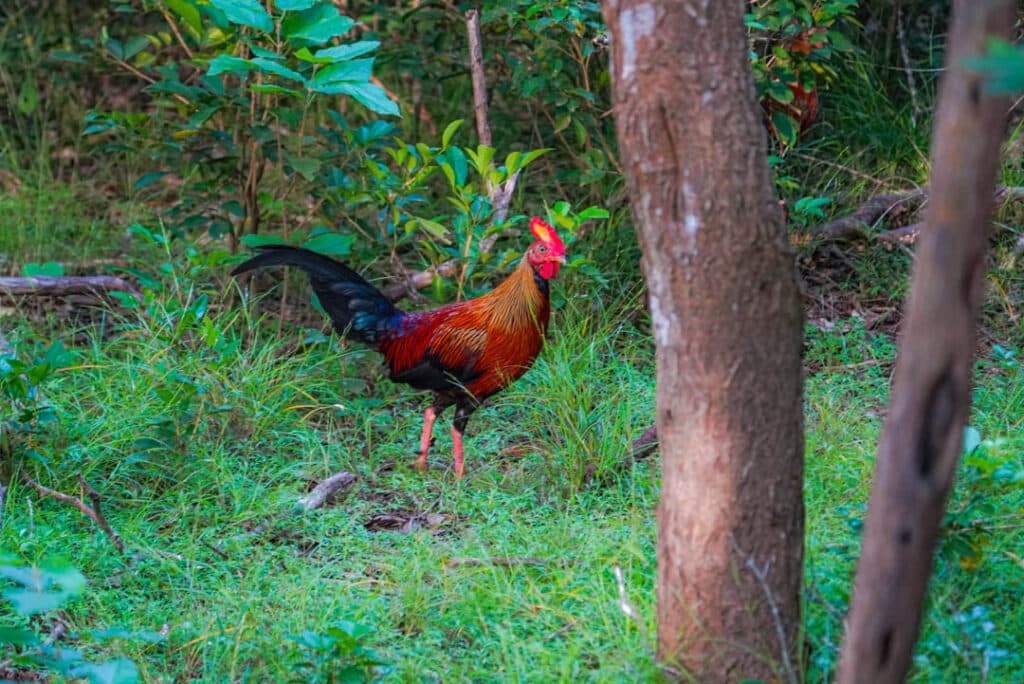
The national bird of Sri Lanka – The Sri Lankan junglefowl
Spotted deer, jungle fowl, jackals, peacocks
It did not take long to start spotting wildlife. The first animals were a pair of jackals that crossed the road. I was not able to get a good picture of them as my camera settings were not ready for the early morning light and dark jungle. The next sighting was a jungle fowl, which is the Sri Lanka national bird. The next spotting was a spotted deer.
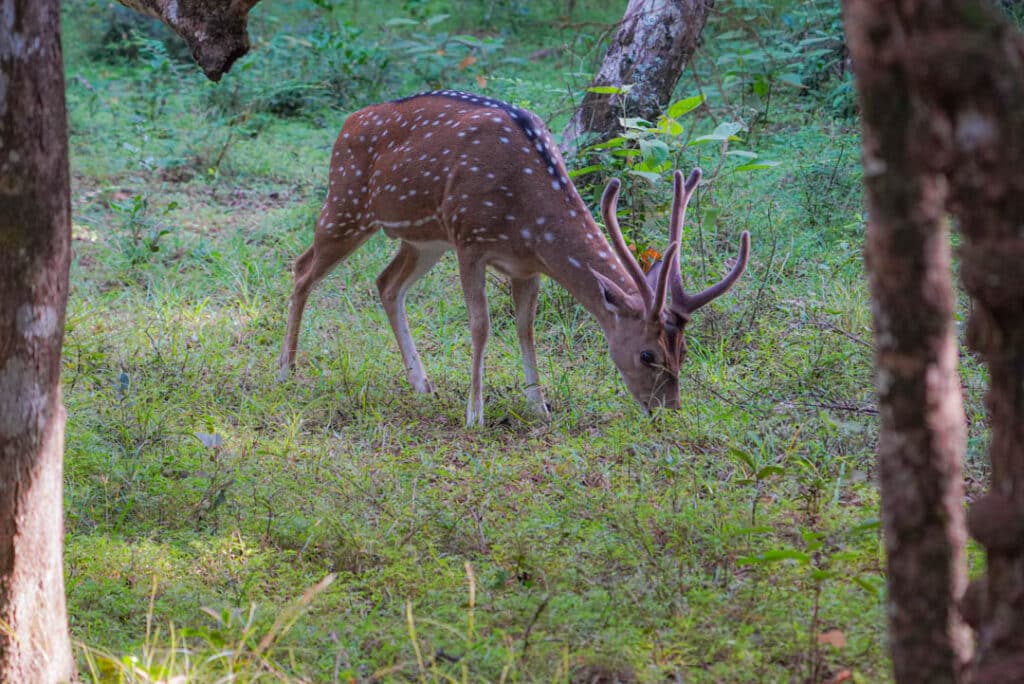
Spotted deer on day 1 of a Wilpattu National Park Sri Lanka adventure
I saw my first Indian peafowl AKA peacock the night before in the brush beyond my hotel. It was dark, and somewhat far away, so I was not able to get a photo. Peacock are extremely common in Sri Lanka, so it did not take long to see several sightings of both male and female. I had my driver stop a couple of times for photos. It did not take long to get so accustomed to them that we just drove past them although I still enjoyed seeing them each time.
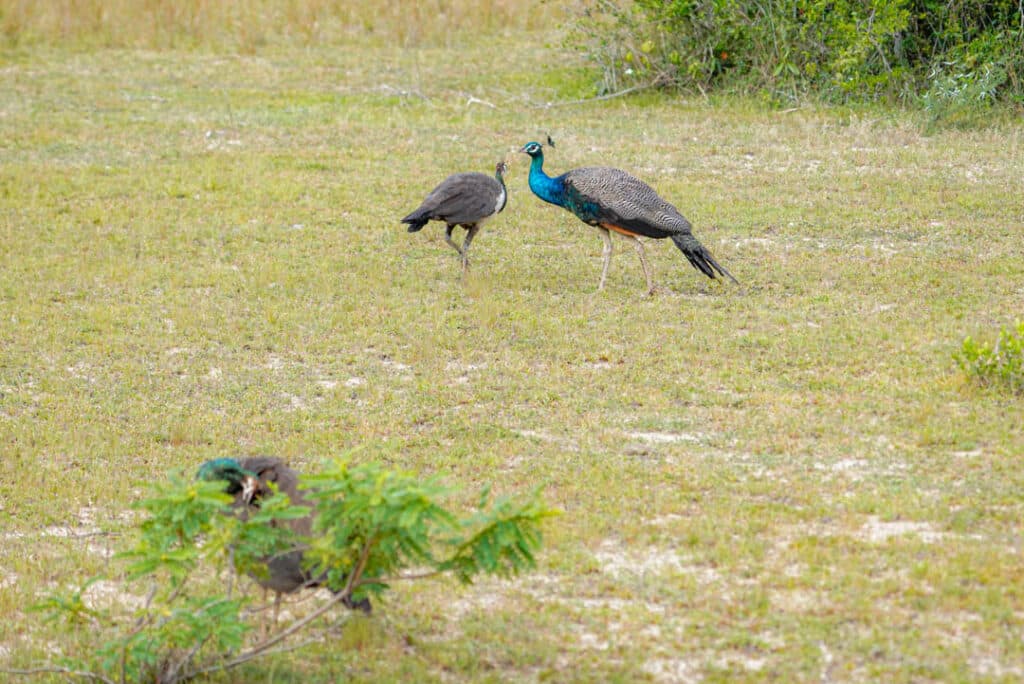
Two Indian peafowls – one peacock and one peahen
Wilpattu National Park Sri Lanka sloth bear
We were one of the first through the line, and one of the first trucks into the park. Our safari got off to a great start as within 15 minutes of driving, a sloth bear was sighted just off the road foraging for food. It was not concerned with our presence at all and even ambled on to the middle of the road and held up traffic. We had the bear to ourselves for a few minutes, but soon all the other trucks caught up and it was a sloth jam. The sloth bear still did not mind the extra attention and kept going about its business. The sloth bear was much smaller than the black bears I have seen in the United States, but it did have some impressive claws.
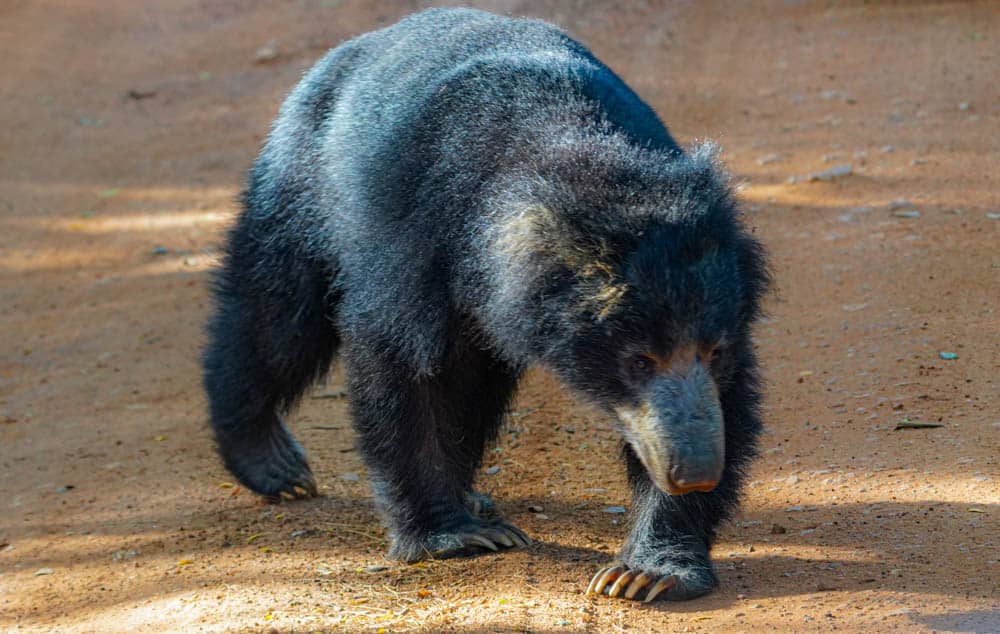
The star of the morning for day one was this Sri Lankan sloth bear seen within 15 minutes of entering the park.
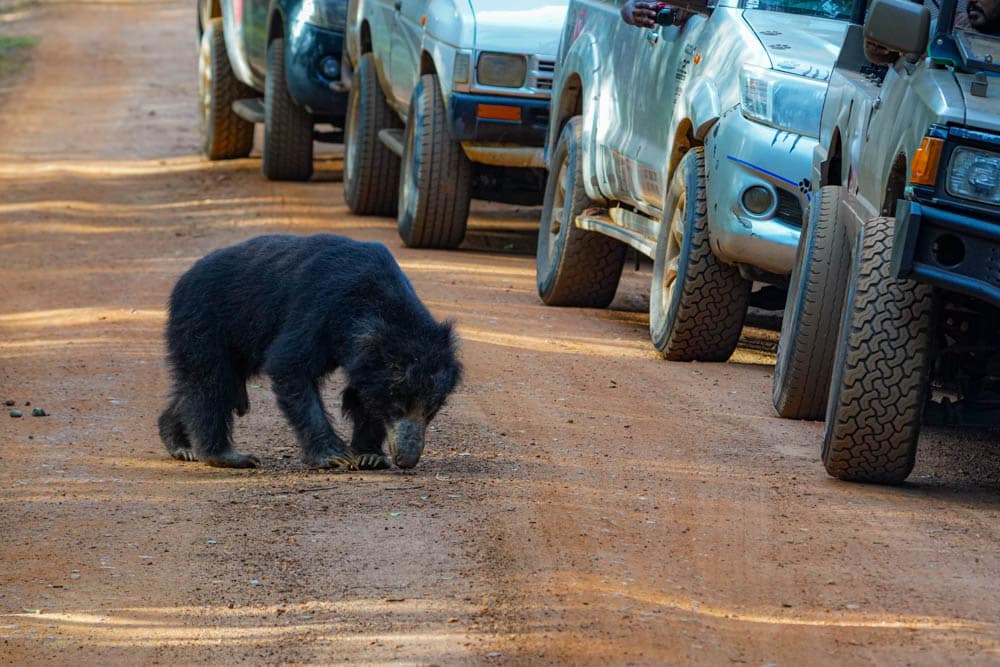
The sloth bear paparazzi did not seem to irritate it
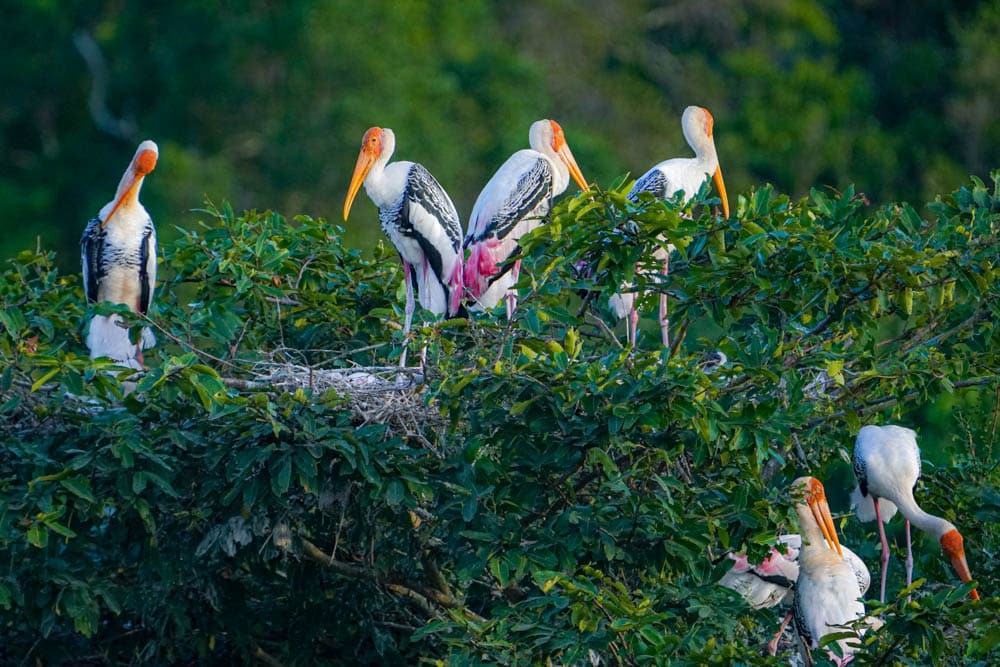
A group of painted storks again within the first hour of entering the park
Wilpattu National Park Sri Lanka is a hotspot for birds
I have already mentioned that we saw peacock and jungle fowl within the first mile of entering the park. Sri Lanka is known for its incredible birding and Wilpattu is a birding hotspot in a country known for birds. The bird sightings were nonstop. Wilpattu means “natural lakes” and when we got deeper into the park, we started to see many of these small saucer shaped lakes that give the park its name. Wilpattu is also heavily forested, so the park has a varied ecosystem, which means a large variety of birds.
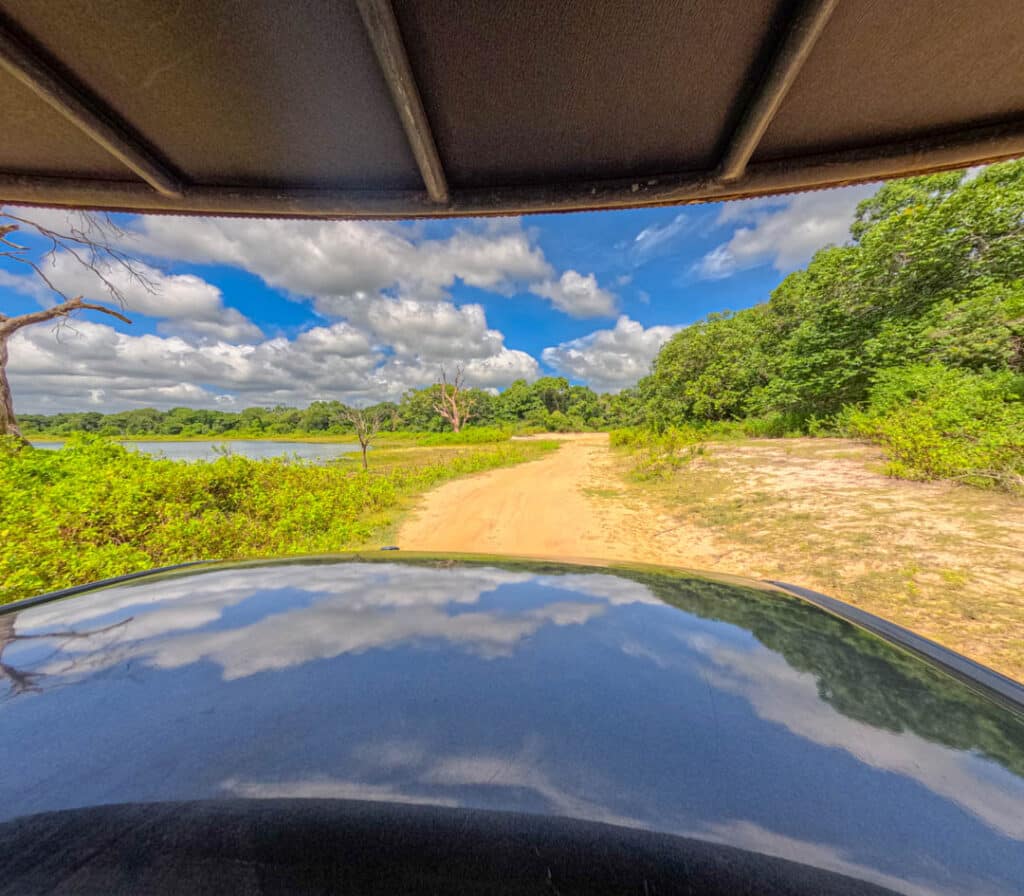
Example of the beautiful lakes in Wilpattu National Park
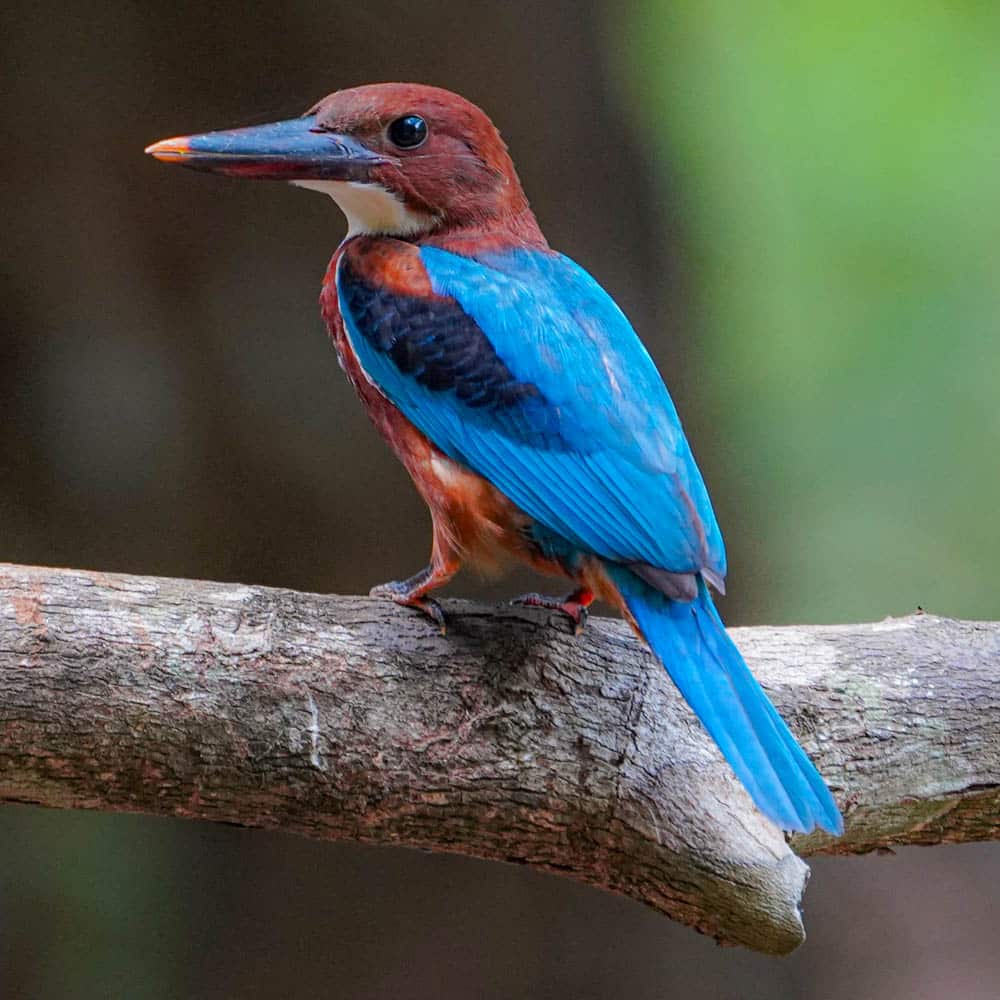
White-throated kingfisher
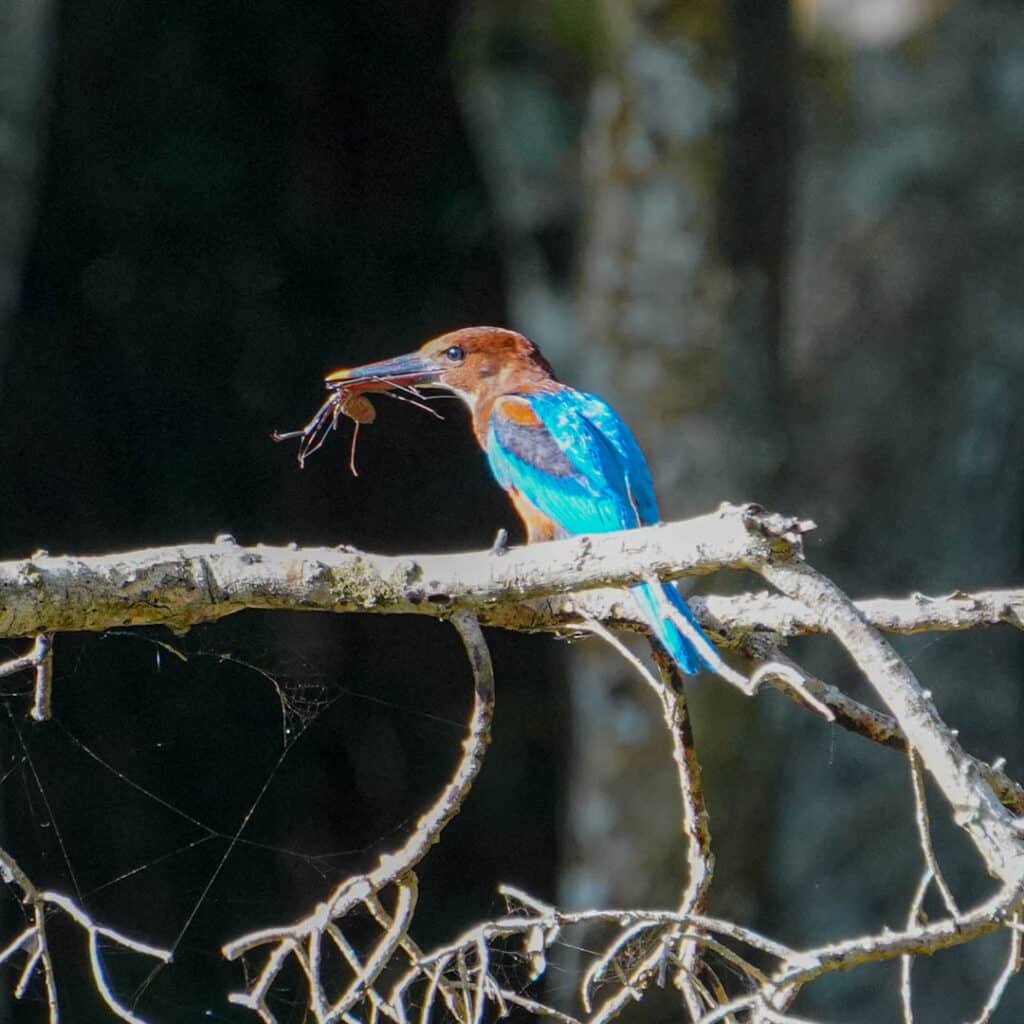
A Wilpattu National Park Sri Lanka white-throated kingfisher doing mankind a favor by doing away with whatever creepy crawly it could find.
This became apparent quickly. We saw woodland birds coming in the road. Then we started seeing the water variety as we came across small ponds and rivers. There was a pond with a roasting group of painted storks. We came across another pond where we were able to view white-throated kingfishers and common kingfisher up close. Many people when on safaris only want to see they sexy animals like sloth bears, elephants, and leopards, but you only see a few of those on each trip and sometimes none, so it pays to be interested in birds. If you are interested in birds, you will never be bored as they are everywhere.
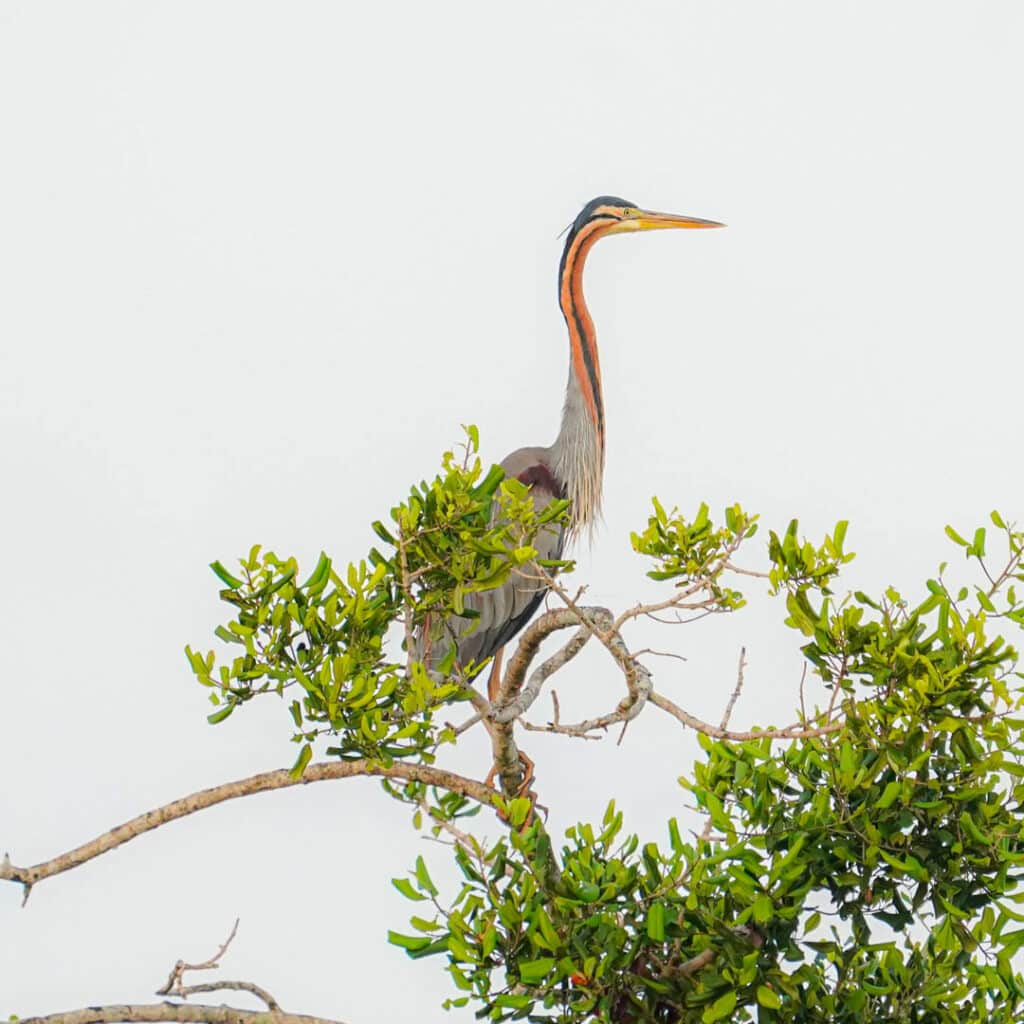
Beautiful purple heron – Wilpattu National Park Sri Lanka
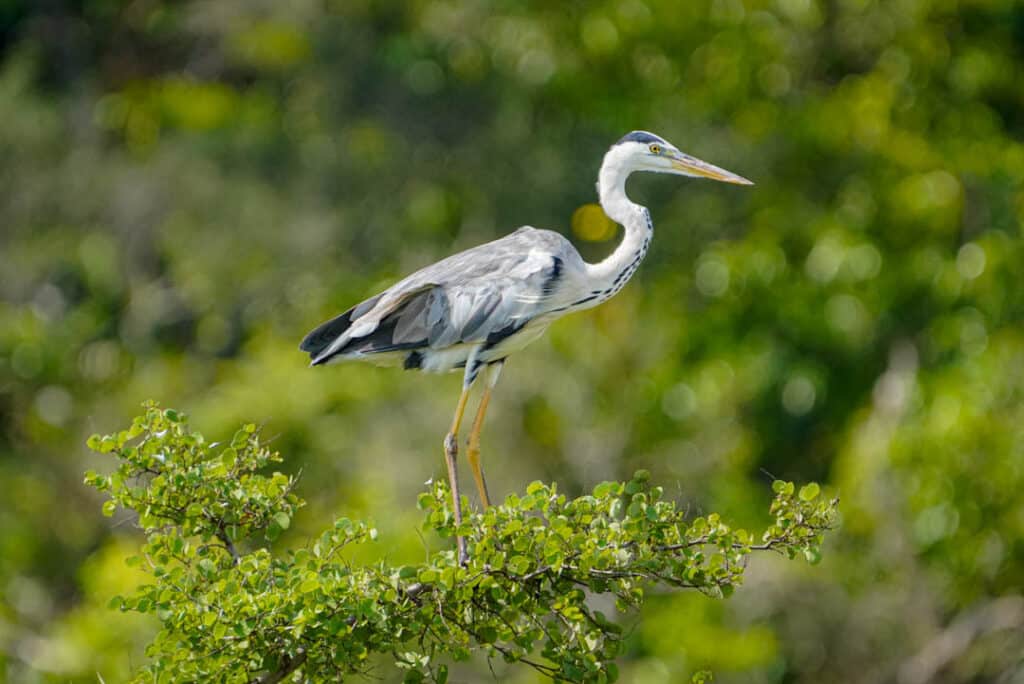
Gray heron – Wilpattu National Park Sri Lanka
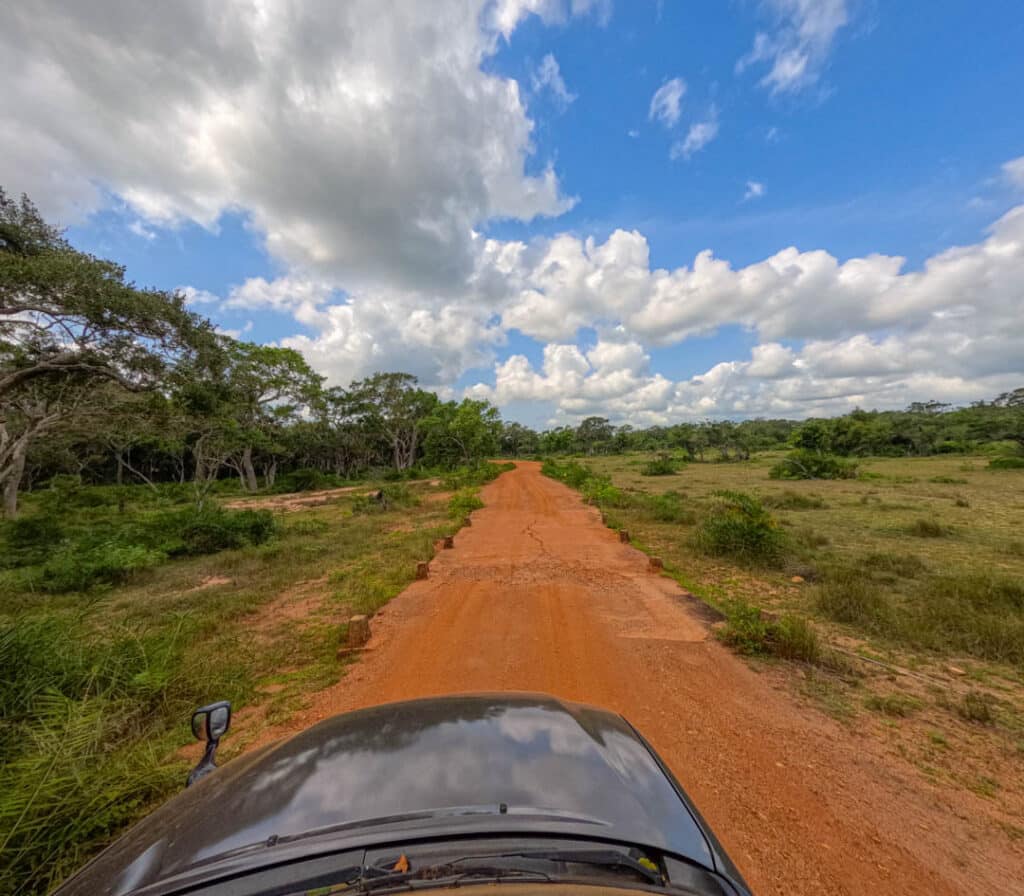
Wilpattu roads take me home, to the place. . .
Wetland birds in Wilpattu National Park
Once we got deeper in the park, we really started seeing an incredible array of wetland birds. We saw many types of herons and egrets, ibis, kingfishers, darters, and cormorants. In the United States, the most common big heron is the great blue heron. In Sri Lanka, they have two similar looking herons – the purple and the gray heron. We saw both species in the lakes of Wilpattu.
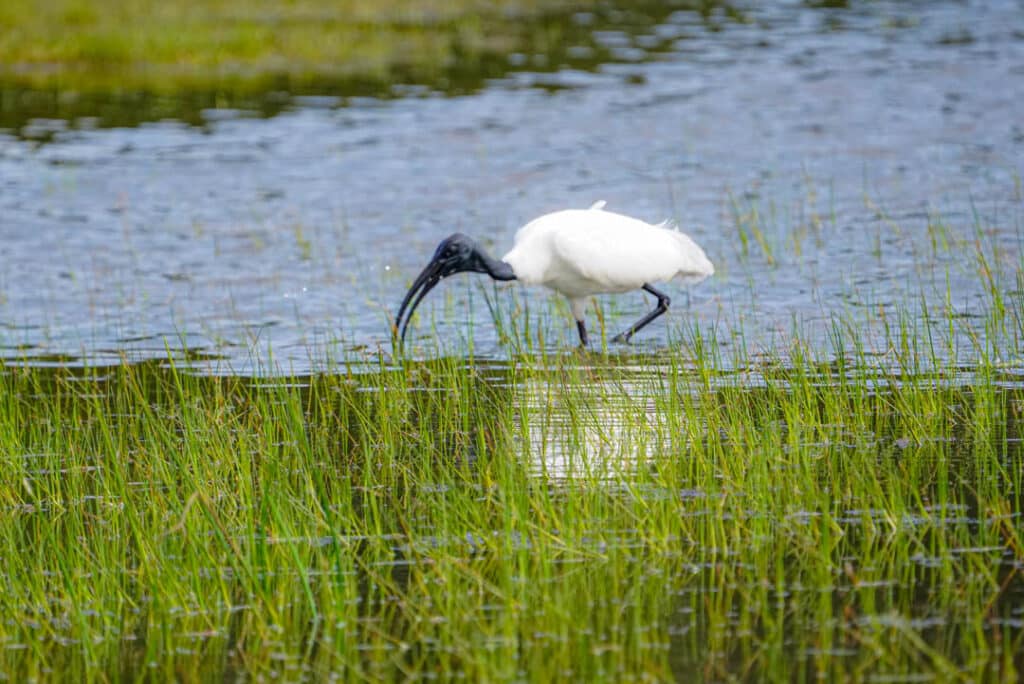
Black-face ibis
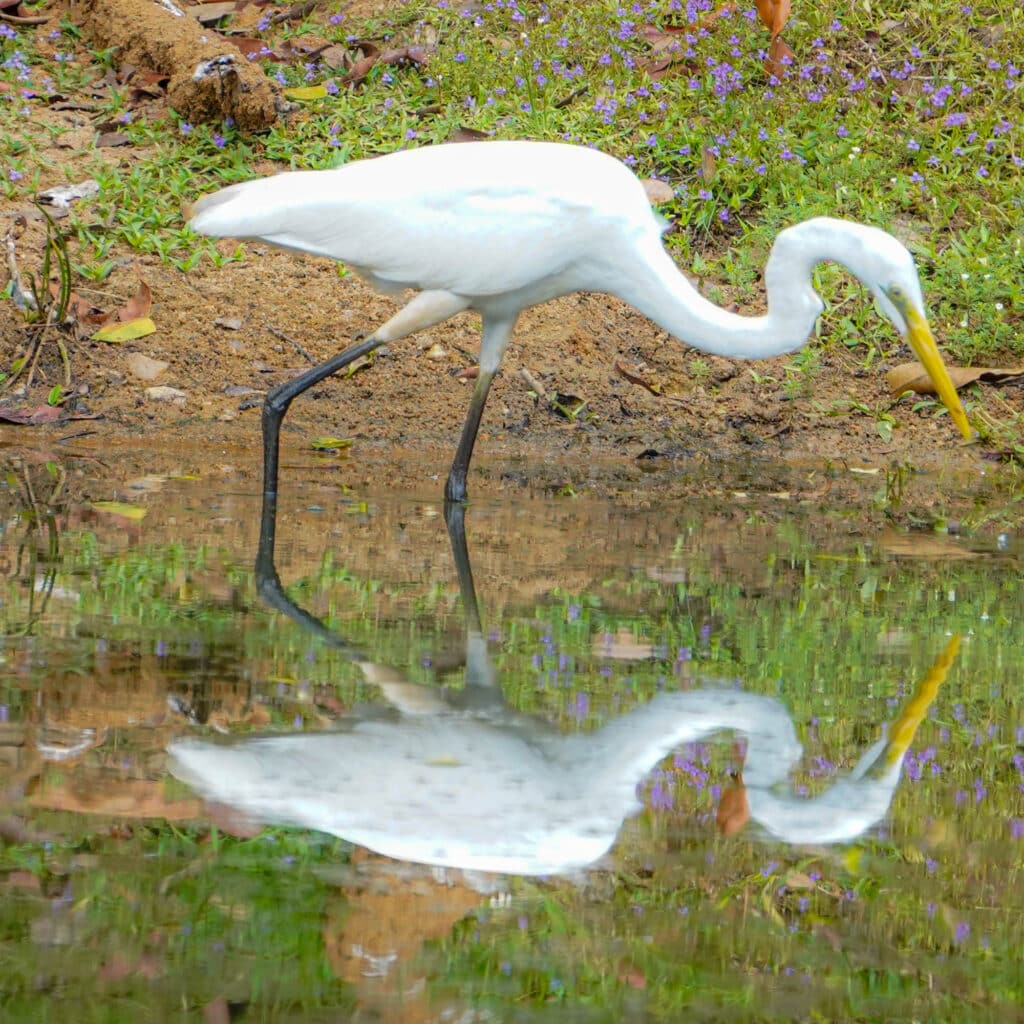
Beautiful great egret and reflection in Wilpattu
We also saw a variety of smaller wading birds. As mentioned earlier, the national bird is the jungle fowl; however, it should be the red-wattled lapwing. These birds are everywhere. I even saw some of these on the lawns of the parks in Colombo and the National Museum. We spotted several here in Wilpattu. We also saw black-winged stilts, several species of storks including the woolly-necked stork, open-billed stork, and greater thick-knee also called the great stone-curlew. Thick knees are ground birds with a long bill that like to hang out near water, but they were not along the water’s edge. This species was a new one for me. Many of the species were not new as I had seen many of these same birds in Thailand and even in Africa two years ago.
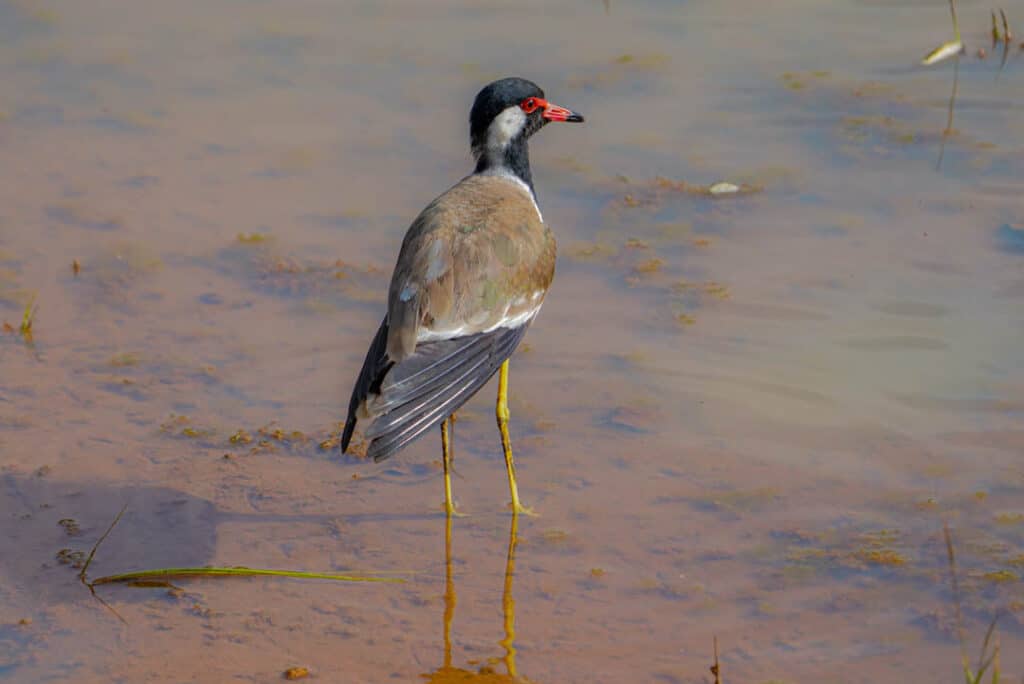
The red-wattled lapwing could be the Sri Lanka bird as it is omnipotent
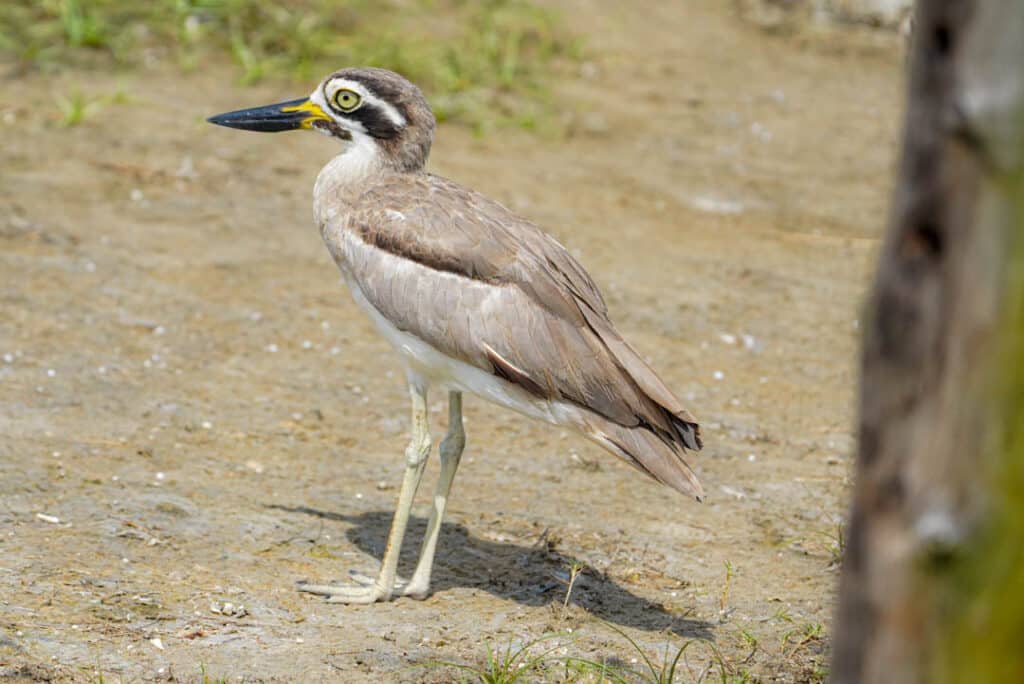
My first great thick-knee
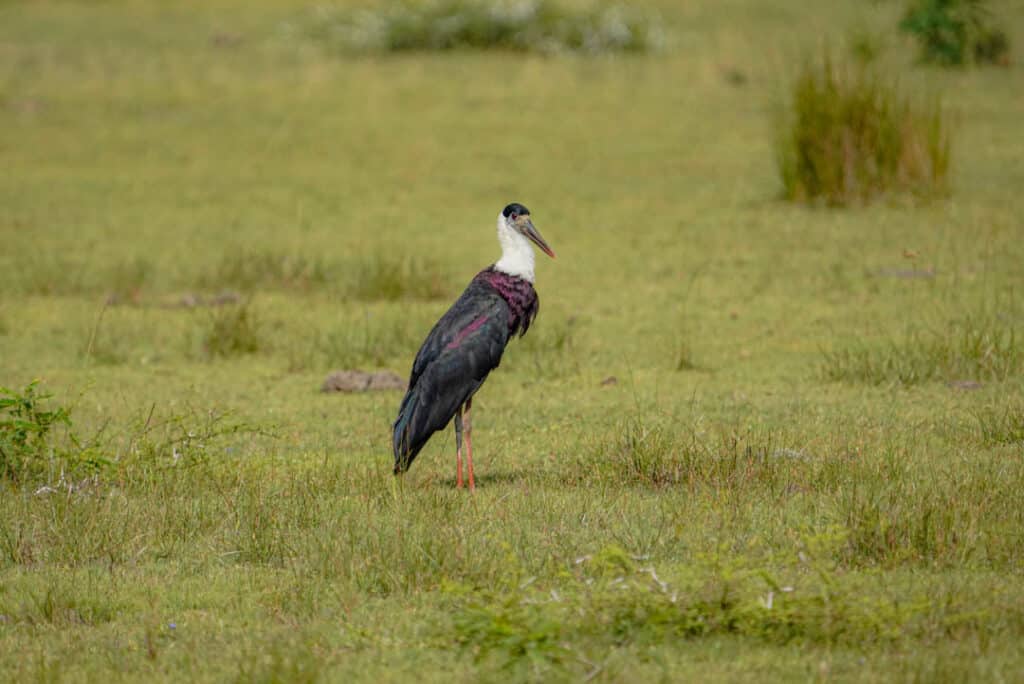
Woolly-necked stork
Where to take a break during the safari
You are not able to take a break anywhere in the park as just like in Africa, it is dangerous with leopards and other animals around. There is a rest area near a lake with bathrooms inside the park. Your guide will stop there if you need to use the bathroom. At the lake, there is an observatory pier where I saw kingfishers, herons, darters, and eagles. It is a break for you but not for birding as there are birds everywhere in Sri Lanka.
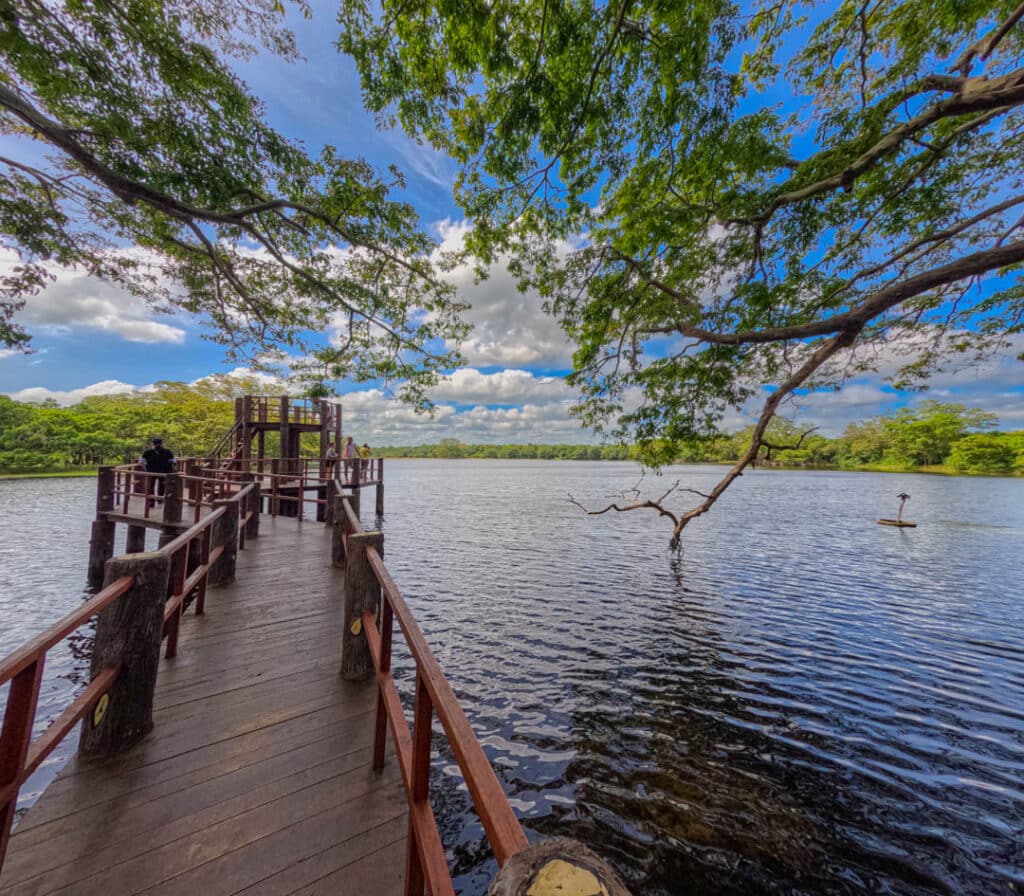
Wilpattu National Park rest stop
Woodland birds in Wilpattu National Park
Jungle fowl was the first woodland bird that we saw, but the pretties was the Asian emerald dove. We saw two of these in the forest. One was right on the road. They have a beautiful green back and a purple throat with a blue cap.
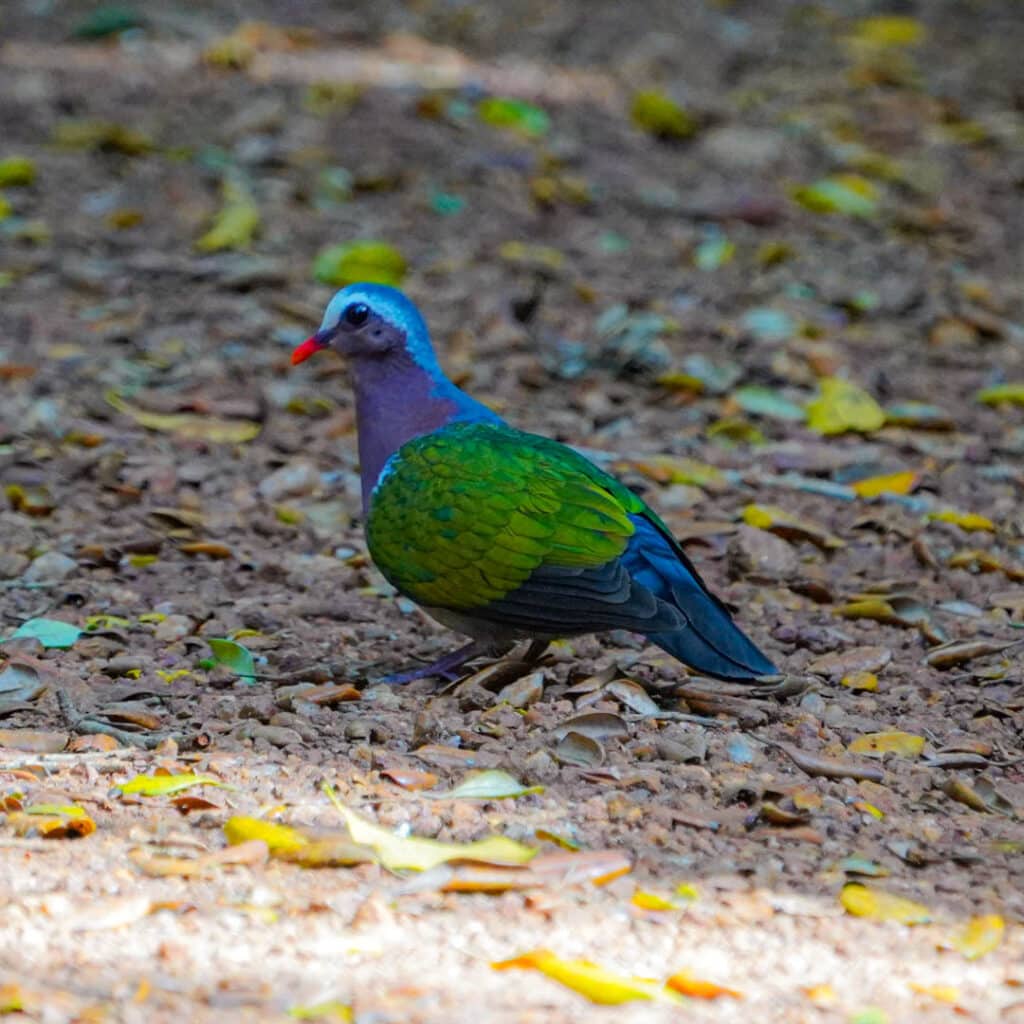
Beautiful Asian emerald dove
We kept seeing this one bird with a long tail flying across the road, but we could never get a good view of them. On the last day, we came across one that was more camera friendly. It was called a Sri Lanka shama and it features a long black tail, brown underbelly, and a white rump, which almost appeared as a cross. I got several good views of one on this last day.
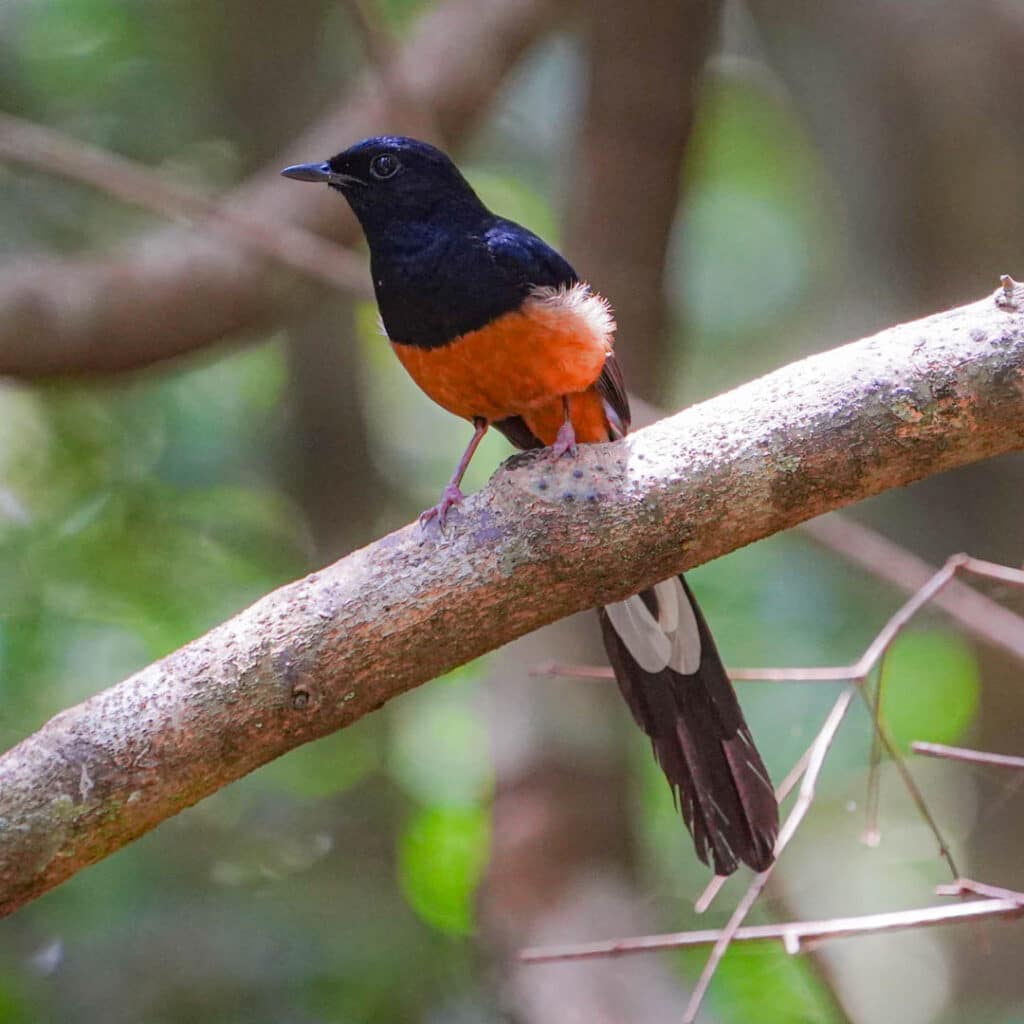
Beautiful Sri Lanka shama
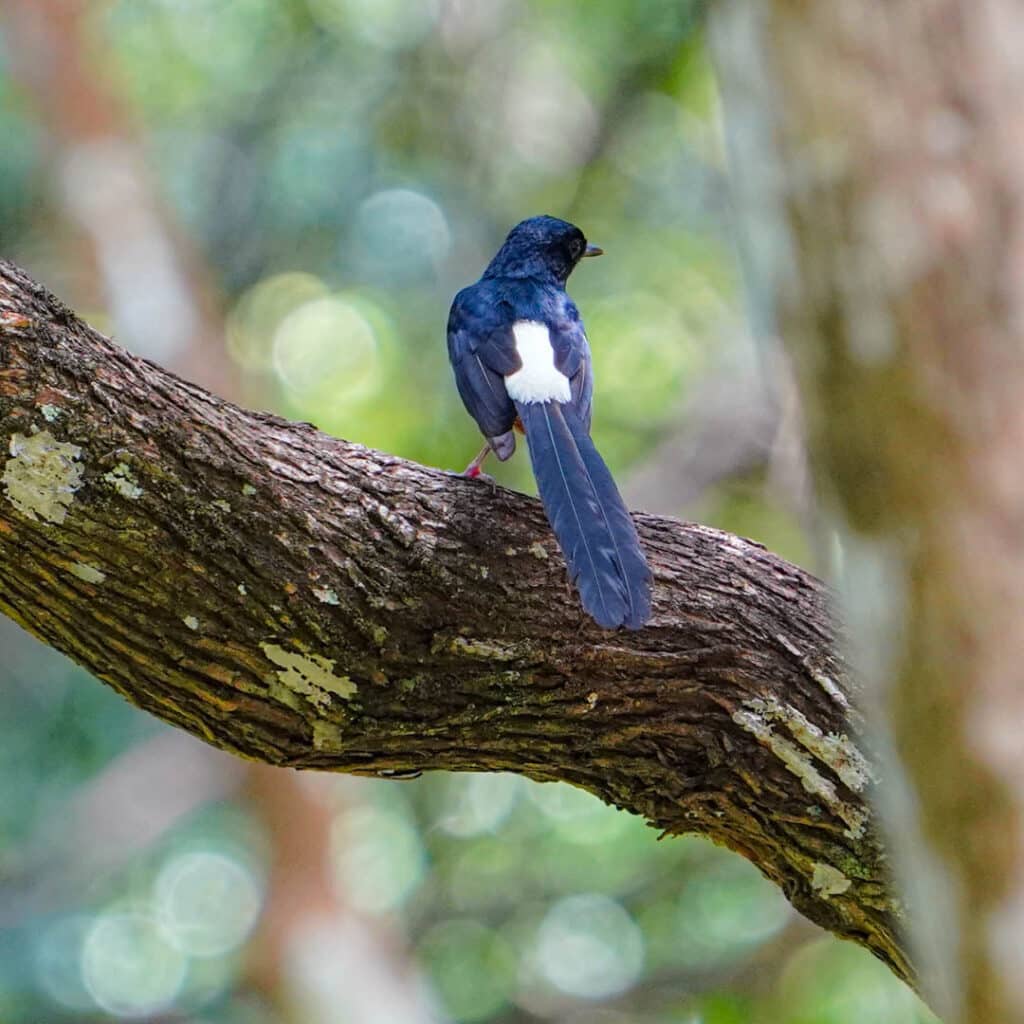
Sri Lanka shama – The white rump on its back
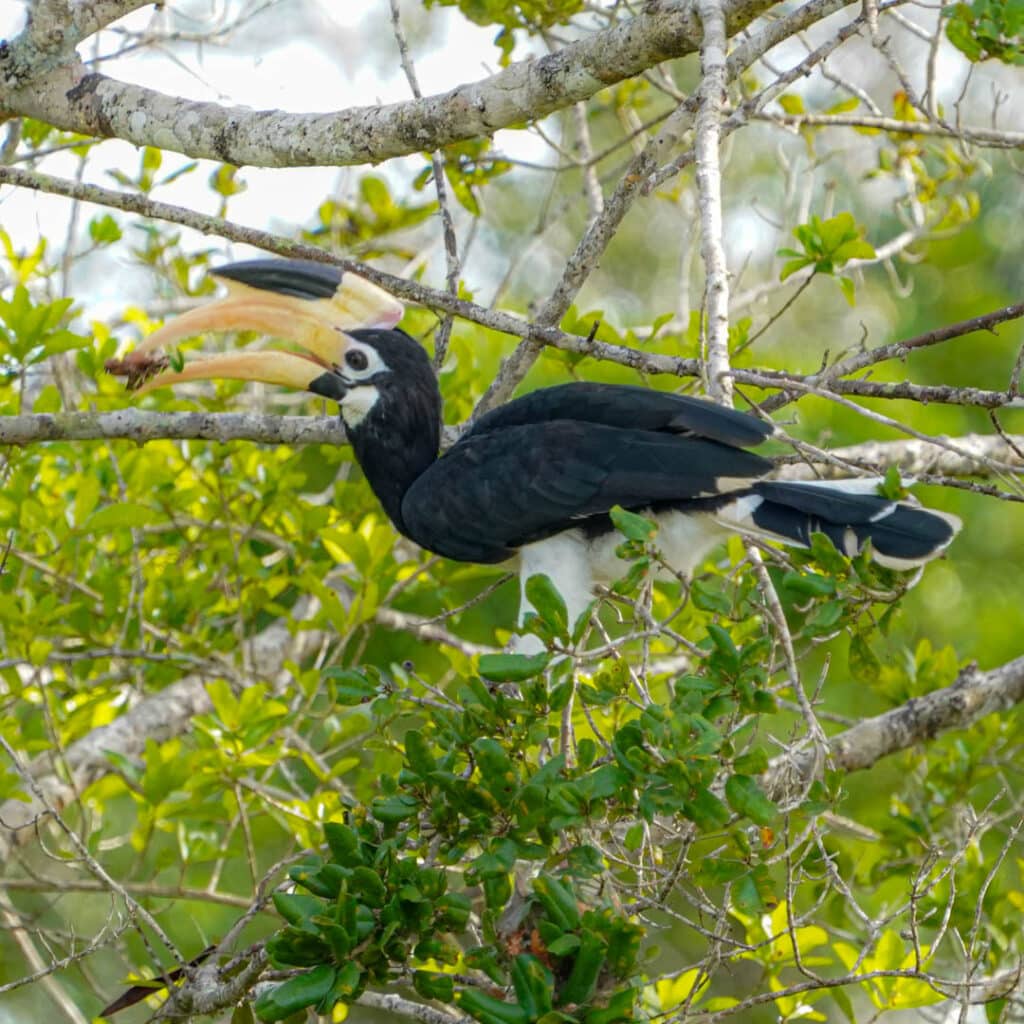
Malabar pied hornbill with what looks like a small hoopoe in its beak
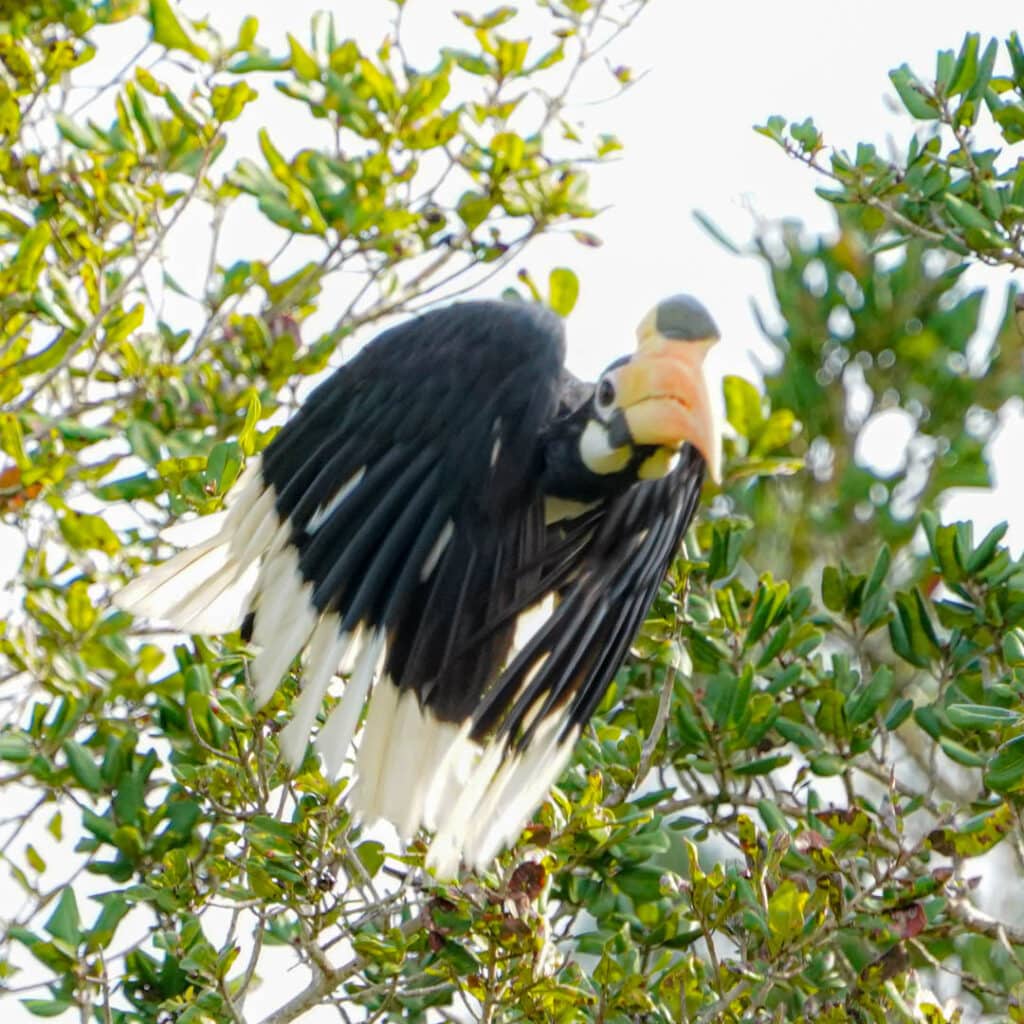
Malabar pied hornbill in flight
One of my favorite birds to see is a hornbill. I first saw a hornbill in Thailand, and every time I see one, I am always grateful to see them. In Sri Lanka, they have the malabar pied hornbill, which has a huge bill with a black casque. A casque is an enlargement of the upper mandible or skull. This makes them look very formidable on top of their already prominent beak. We saw several groups feeding in the trees. In one photo, I believe one of the birds is eating a baby hoopoe.
Related: Khao Yai National Park Thailand photo essay
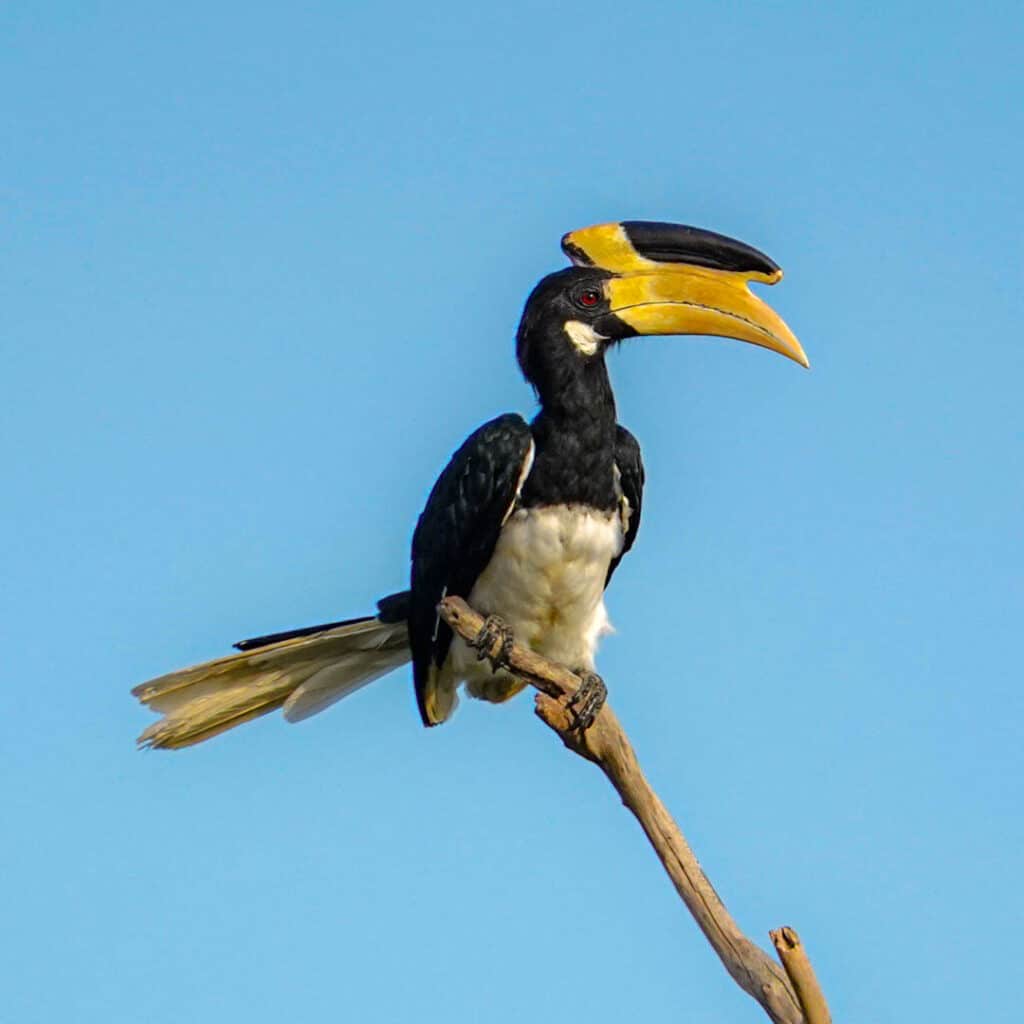
Profile of a malabar pied hornbill
Wilpattu National Park birds of prey
The birds of prey in Wilpattu National Park was impressive. What was really incredible was how close we got to some of the birds. We saw them everywhere including in the woodlands five feet from the road and all over the place in the lakes. We saw fish eagles, crested-serpent eagles, changeable hawk-eagle, and the enormous white-bellied sea eagle. Some of the hawks and eagles we saw were literally five-feet away from the road, and they did not fly away. They were almost too close for my zoom camera and could take them sufficiently with my iPhone.
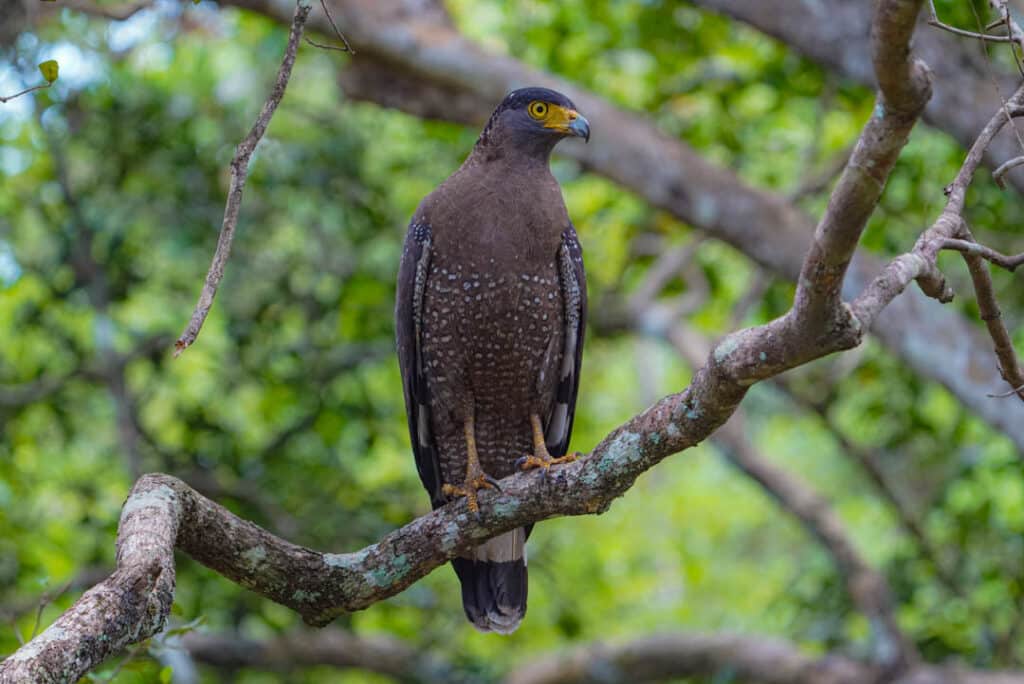
One of the several eagles that were seen super up close – Crested-serpent eagle
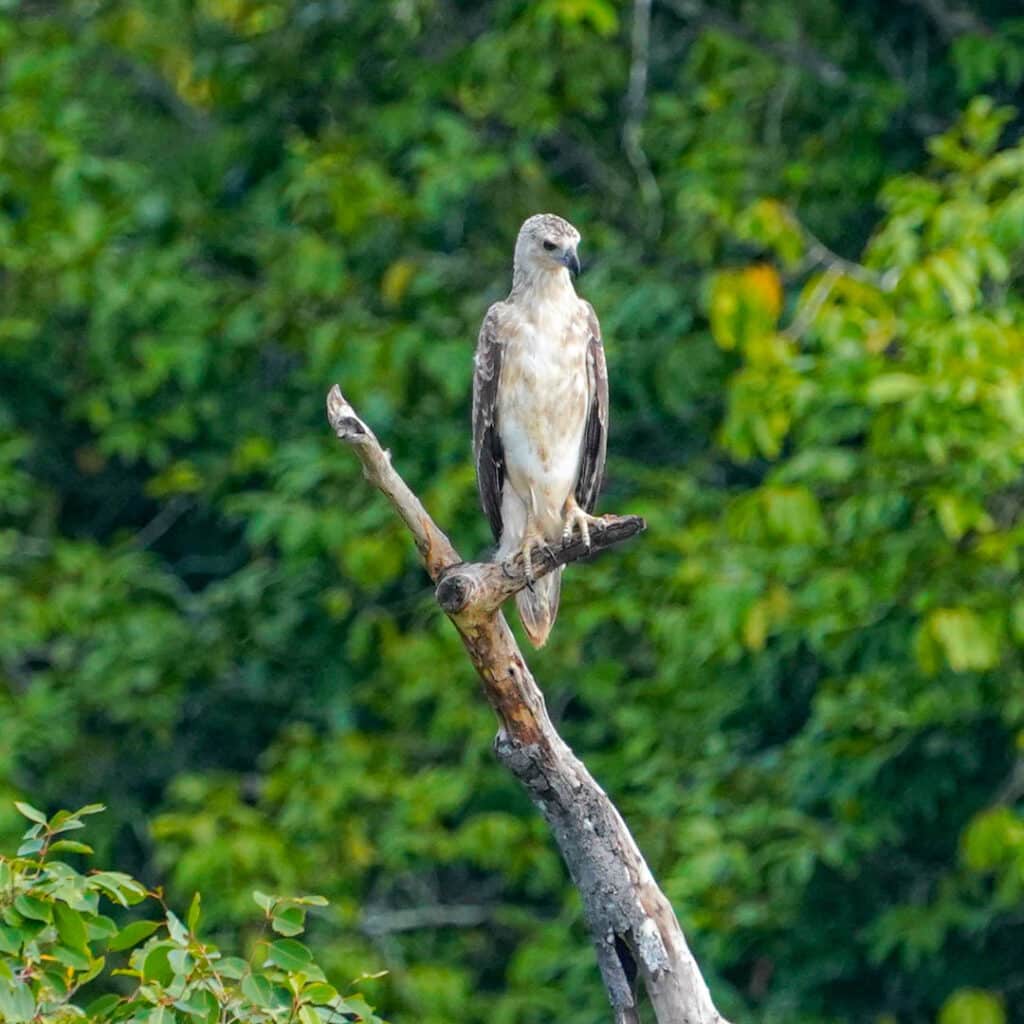
Enormous white-bellied sea eagle
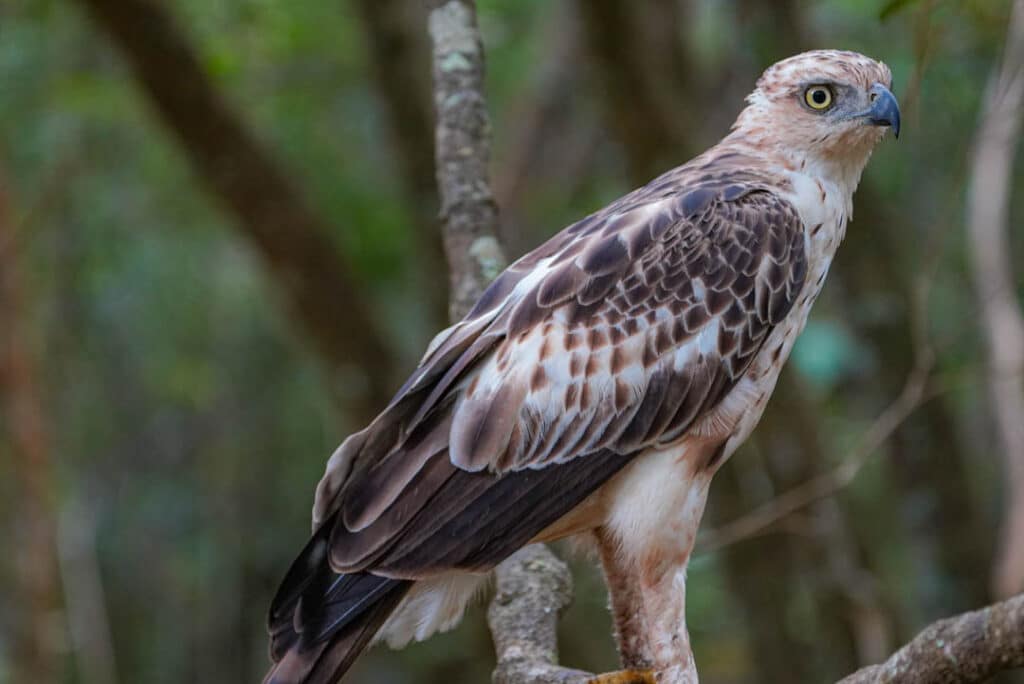
When a changeable-hawk eagle is too close. This was taken at 200mm on my 200-600 mm camera. I could not get the full bird in view.
Other animals including deer, turtles, lizards, and crocodiles
My guide had phenomenal eyes, and was great at spotting birds and even small lizards while driving. We saw land monitor lizards, turtles, and the reptile highlight was a huge mugger crocodile on the last day as we were exiting the park. We also saw a smaller crocodile earlier in the trip. Despite all the water, we only saw two crocodiles. I believe the big crocodile was a mugger crocodile. We also saw several deer and another pair of jackals. Another interesting sight was seeing a water buffalo in incognito mode. He had water plants strategically placed on his face. I am not sure if he was hiding or perhaps it was a method of keeping cool.
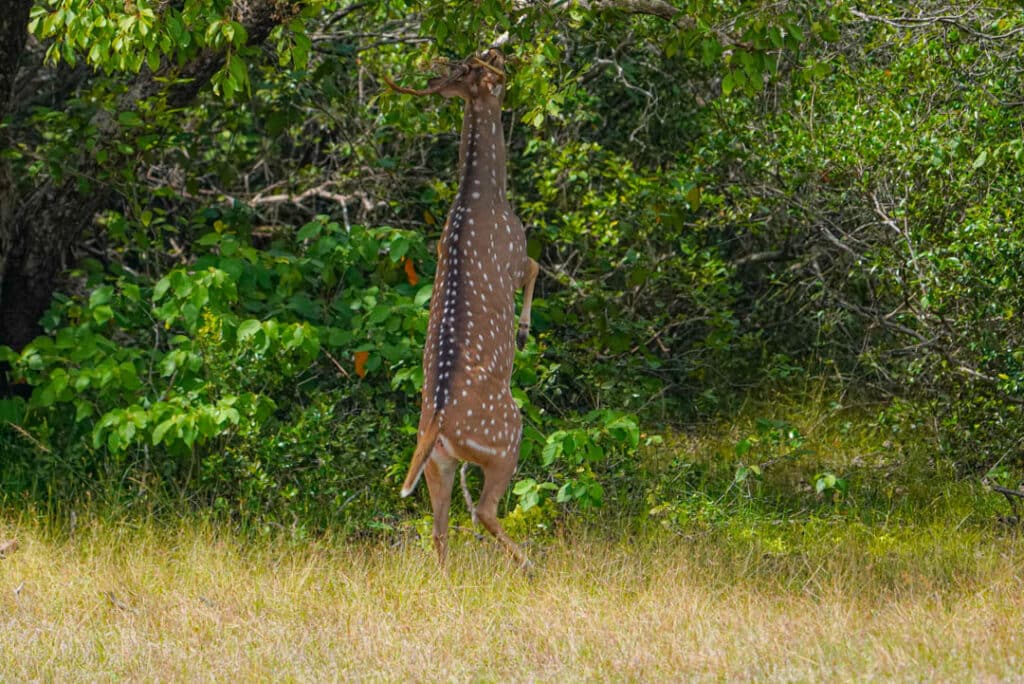
Spotted deer doing a giraffe imitation
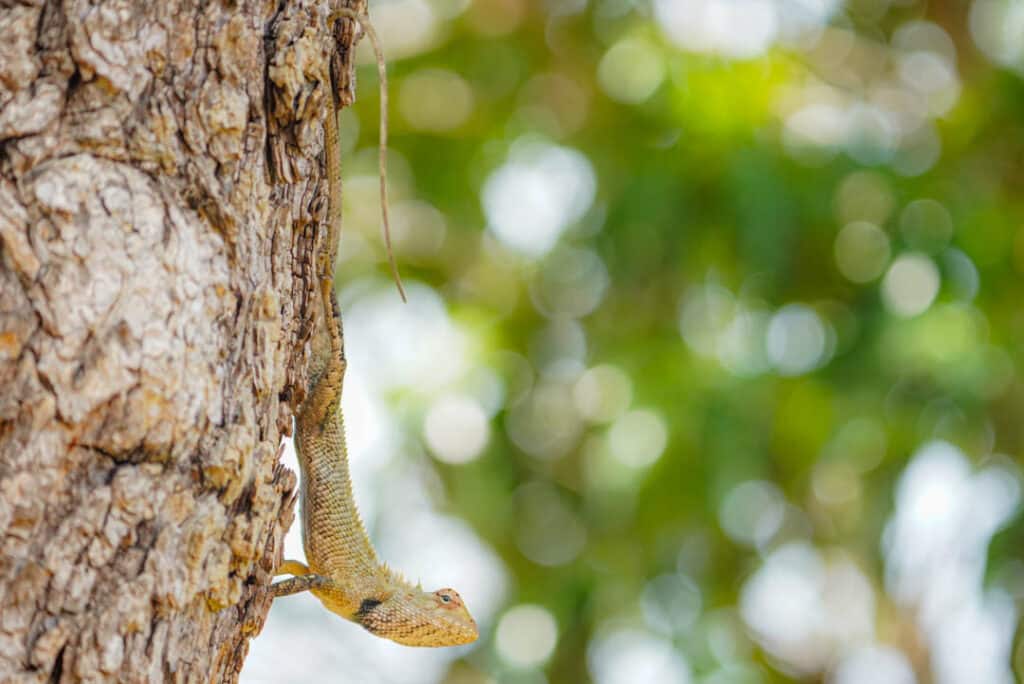
Cool looking lizard
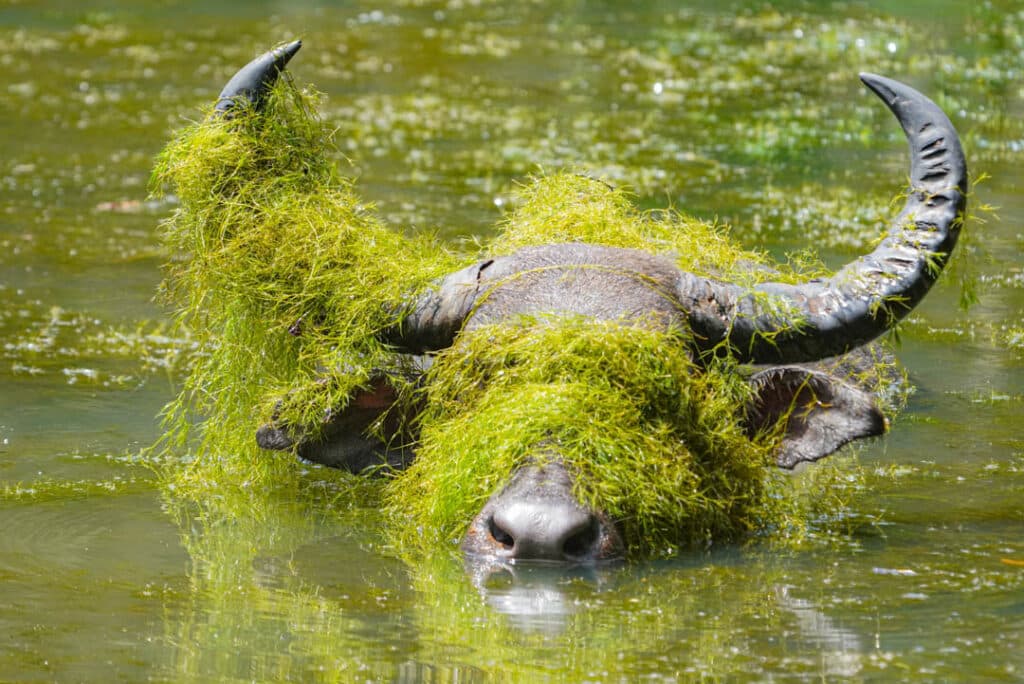
There is no water buffalo here, move along
Elephant sighting in a Wilpattu National Park Sri Lanka lake
While Africa has the big 5, Sri Lanka has the big 3. In Sri Lanka the big 3 consists of leopards, sloth bear, and elephants. I had seen the first two, but the Sri Lankan elephant had eluded me so far. Near the end of the first day, we saw an elephant in one of the lakes. It was the only one we saw both days. We got great views of the elephant as it was out in the open fairly close to the road.
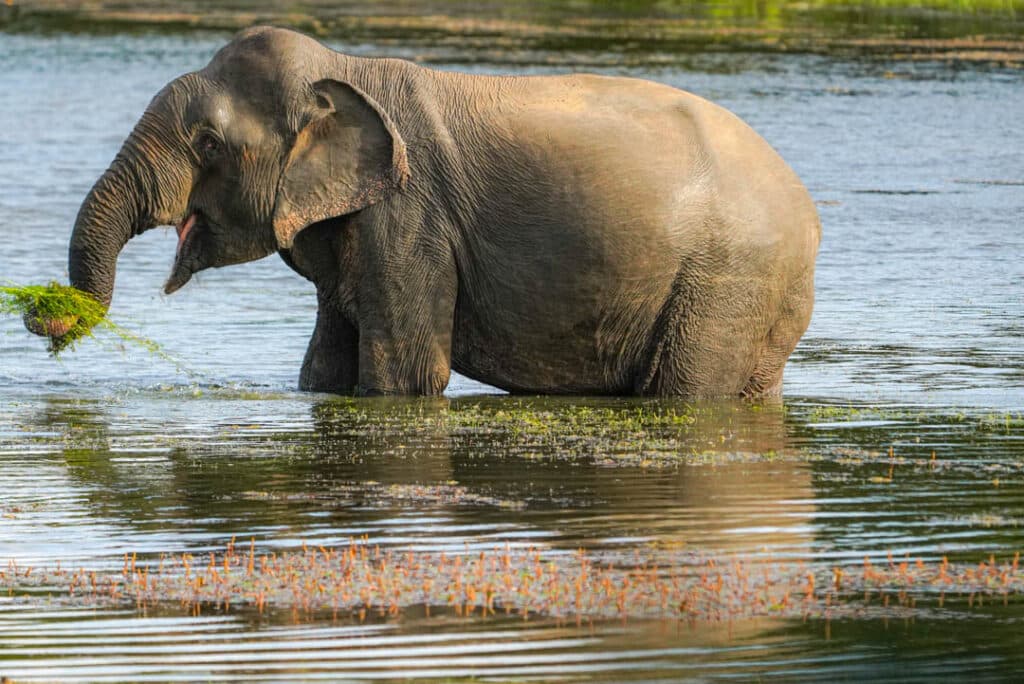
Near the end of day one, we came across our only elephant
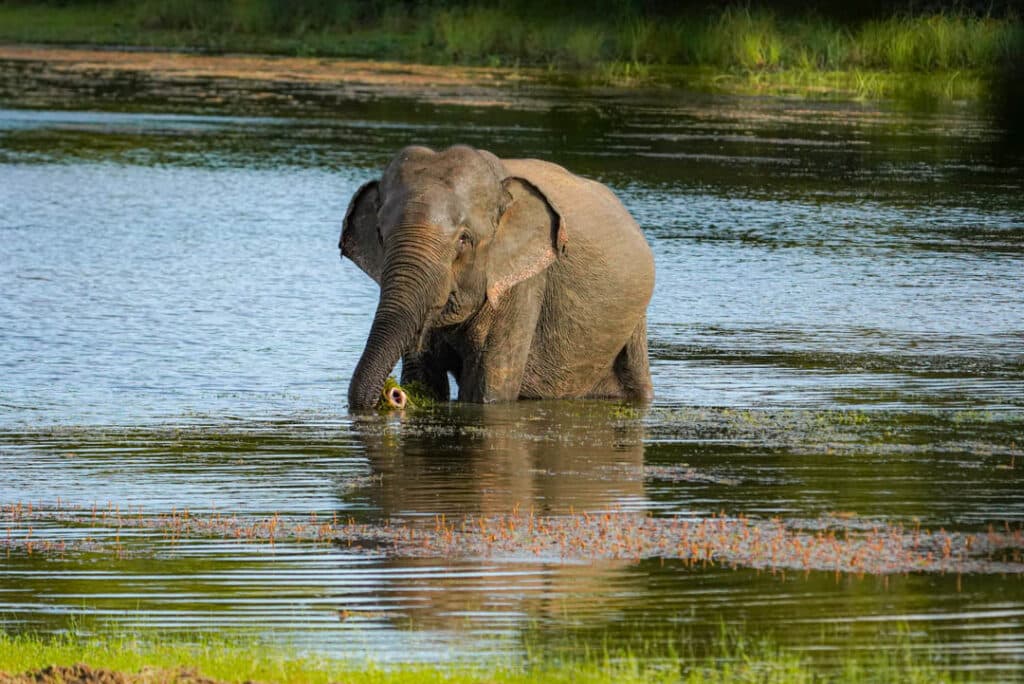
Wading elephant – Wilpattu National Park Sri Lanka
Six leopards seen in Wilpattu National Park
Wilpattu National Park rivals Yala National Park in seeing leopards. I saw an equal amount in both parks, so I cannot say that one is better than the other. The leopard sightings will be covered in a separate post.
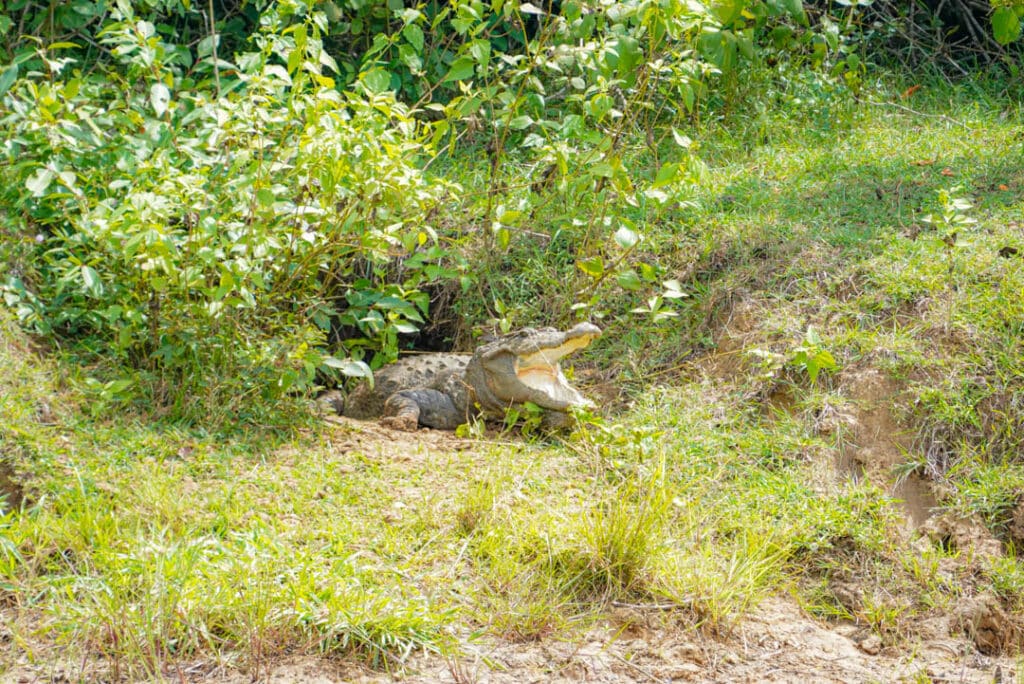
Mugger crocodile finds the awesomeness of Wilpattu National Park Sri Lanka funny
Even the animals think it is funny
Wilpattu National Park is definitely a world class national park with wildlife spotting that rivals any place around the world including Africa. To be clear, African safaris are more incredible, but Sri Lanka safaris are definitely an incredible experience too. While Wilpattu does not have the staggering amount of animals that Africa has, they do have elephants, leopards, sloth bears, and crocodiles. Plus, the birding in Sri Lanka is on par with any place you find in Africa. When you consider other travel variables like food and culture, it makes Sri Lanka one of the best countries in the world to travel to. It is so amazing, even the birds and the animals think it is funny.
Related: Kruger National Park South Africa
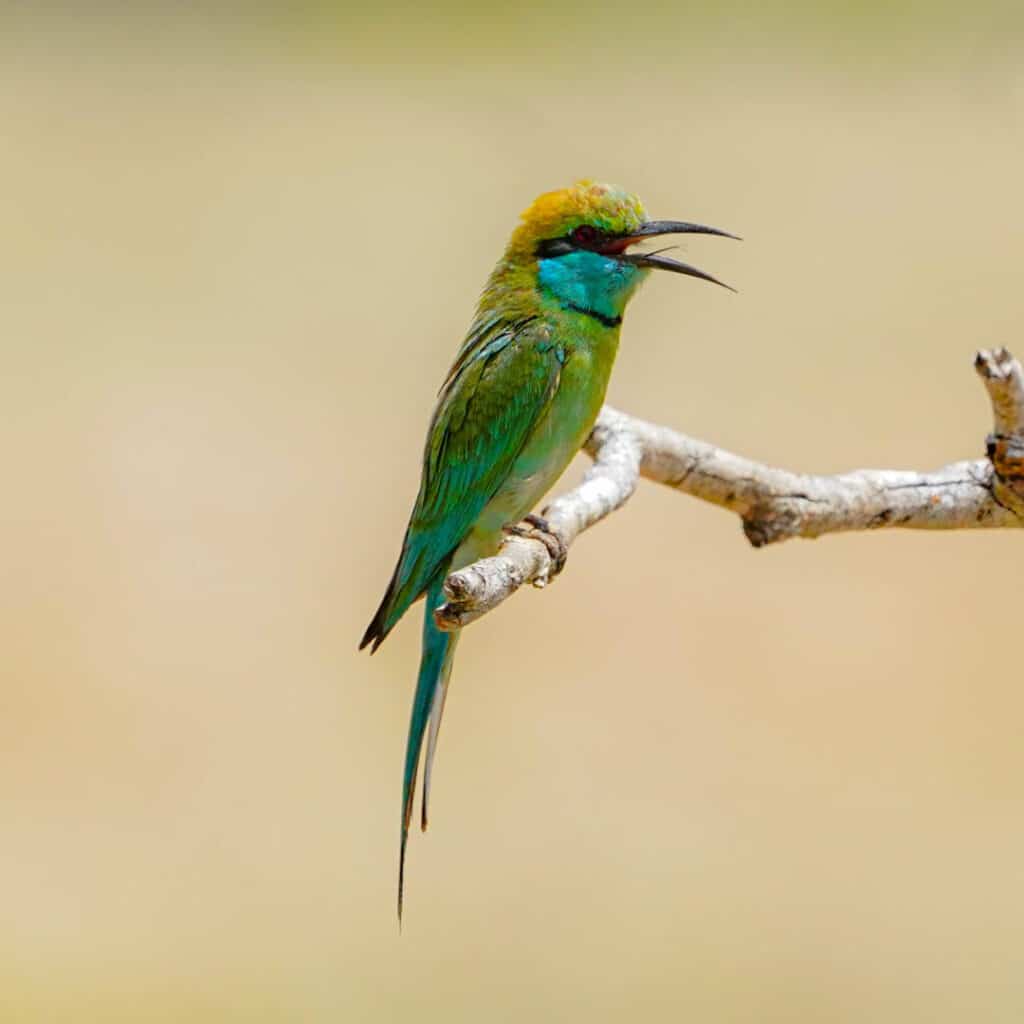
Asian green bee eater found the incredibleness of Wilpattu National Park funny
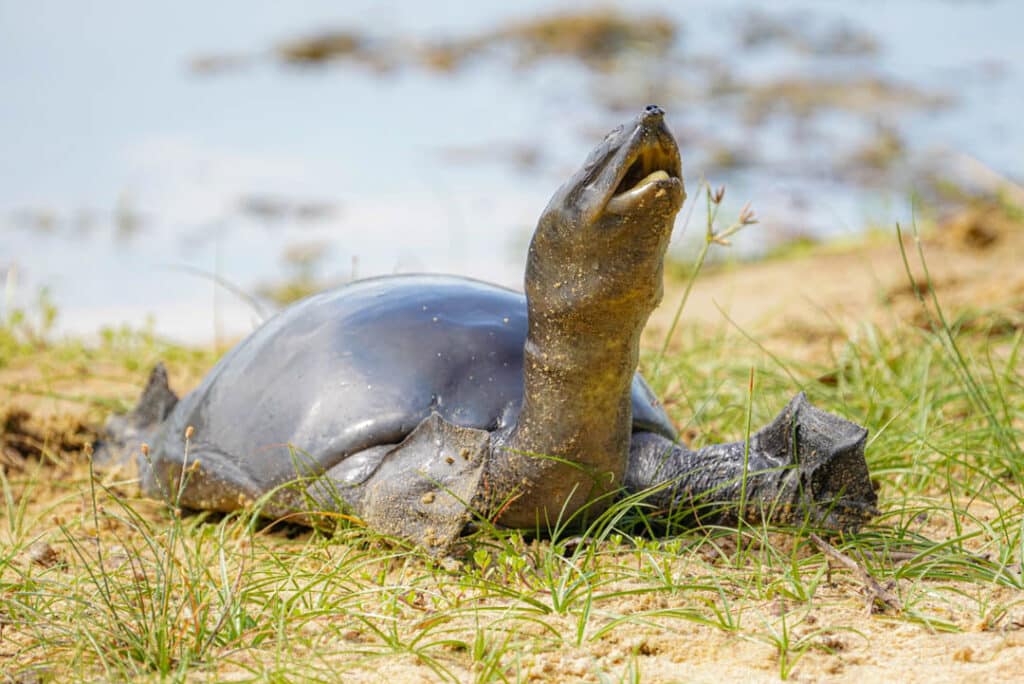
What I think is a flapshell turtle laughing at how stunning Wilpattu National Park is
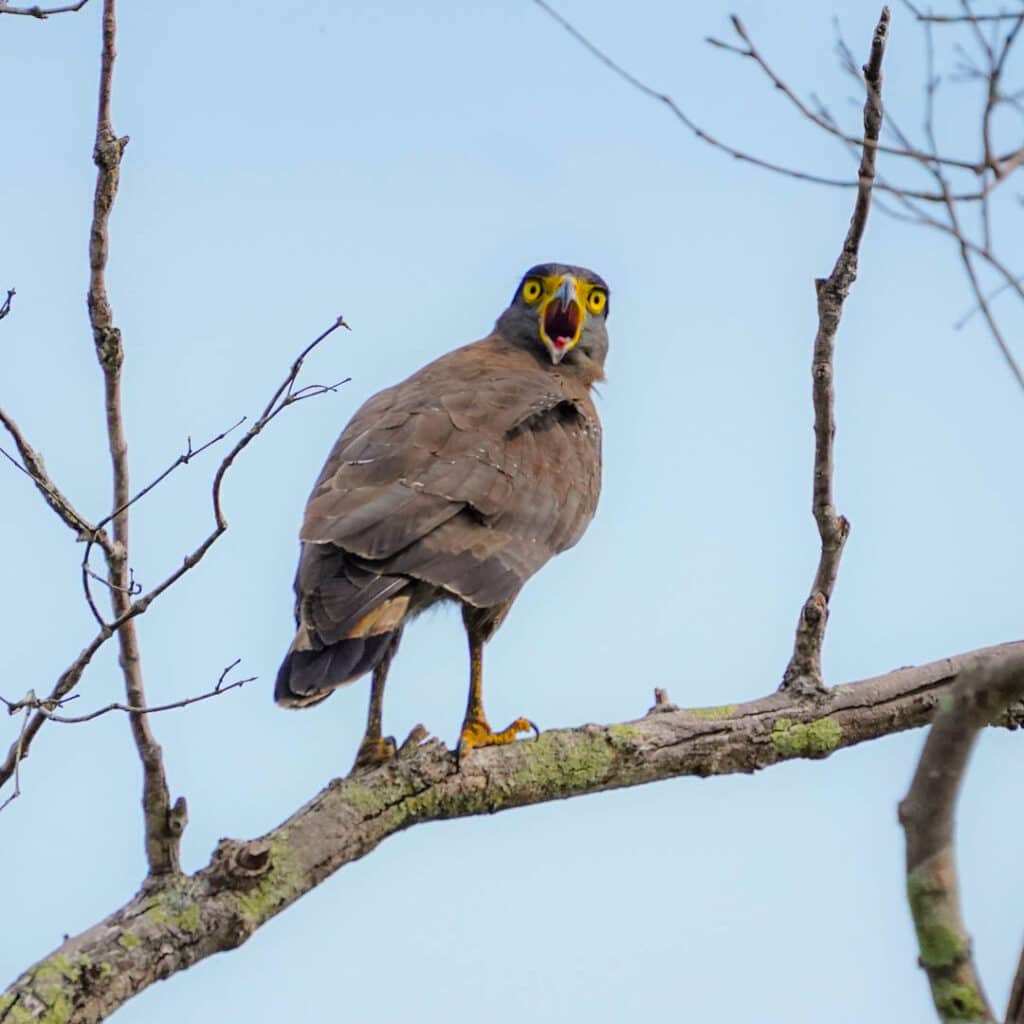
Crested serpent-eagle laughing
Wilpattu National Park tips and information
- Entrance fees – For foreigners, the cost is about $45 USD, which is the same for a half day or full day.
- Cost of a safari guide was $82.00 for full day and $41.00 for half day. I was traveling solo, so it was more expensive for me, but you can cut the cost with other travelers.
- There are places to stay just outside the park for $20 usd. I stayed at a place that was walking distance to the gate and the room was clean, had air-conditioning, and had a hot shower.
- You can also book tours from Colombo on Get Your Guide. These trips will be more expensive, but more convenient. A day trip, which will be a half day inside the park is $105.00 per person, which is a reasonable price.
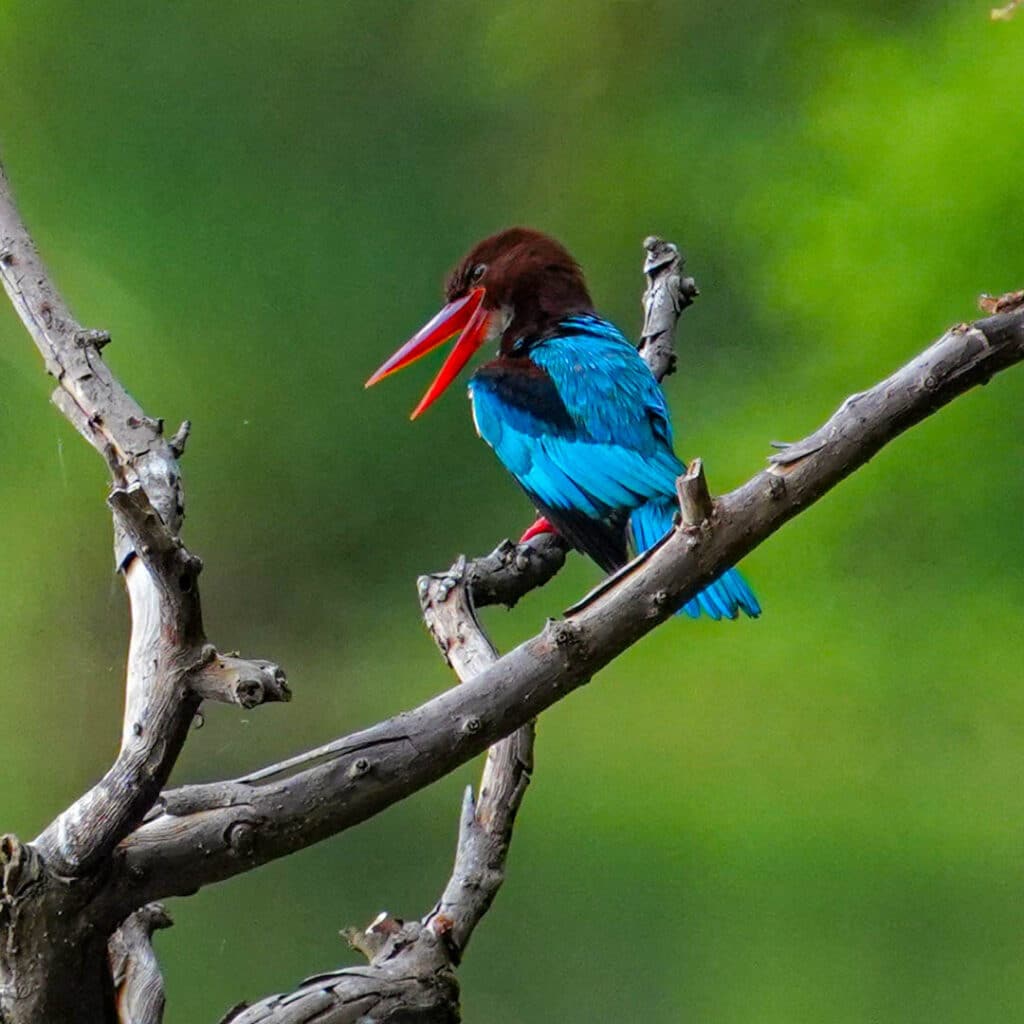
White-throated kingfisher laughing
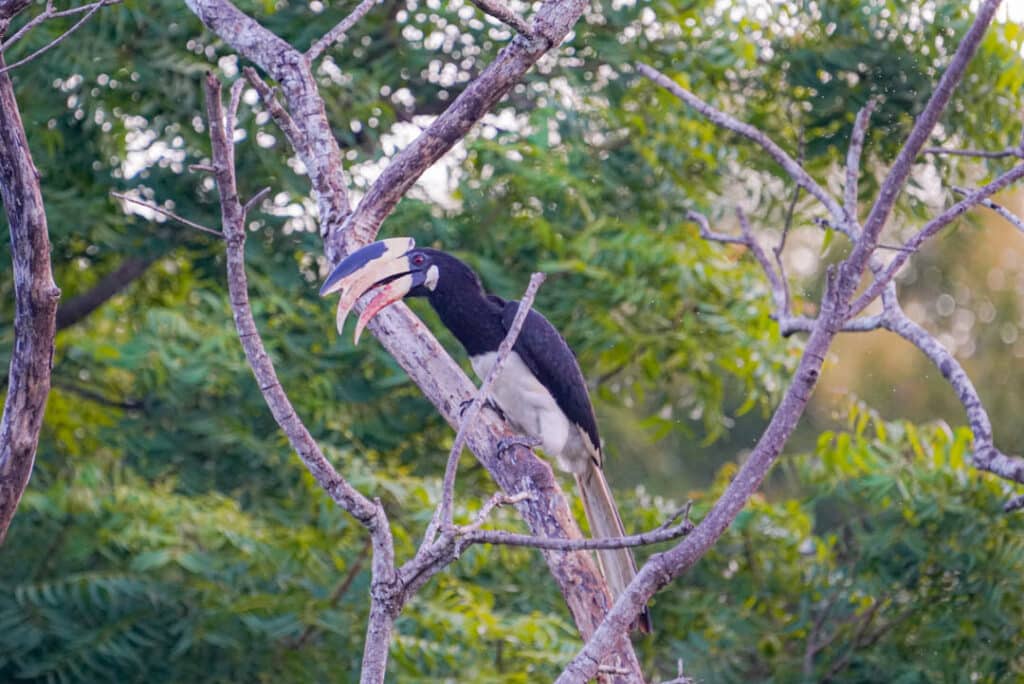
Malabar pied hornbill laughing
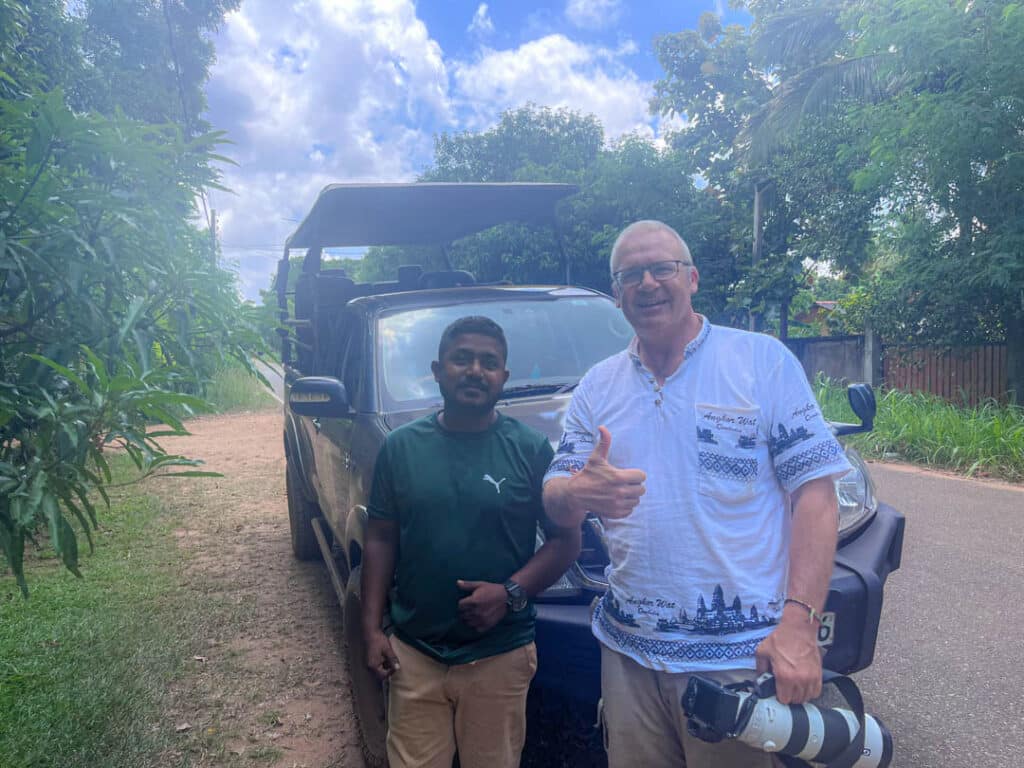
My wonderful guide in Wilpattu National Park Sri Lanka – See you next time.
This is part of a three part series on visiting Wilpattu National Park. This is part two and part three will be written and uploaded shortly. Check out the national park website for more information.
Part I Wilpattu National Park hotels
Part III Sri Lanka leopard sightings in Wilpattu National Park
Adventure on!







